Praha

To summarize, the entire trip was like a pleasant, simple dream in which everyone spoke a couple of languages including English, friendliness was the standard currency of human interaction, and the sterility of tourism rendered all surfaces, historic sites, and scenic views surreal. 
As a consequence of it all, we experienced two unexpected and related emotions within hours of our arrival: ease and relative boredom. We found that when everyone speaks English and no one is surprised to see you, or curious about why the hell you are there in the first place, getting around and by is no longer a challenge. Suddenly, trips on public transportation, for example, while still cheap and effective(!!), don't feel exciting or particularly rewardin g; when you're no longer actively afraid of where you might accidentally end up or how you'll resolve your mini-crisis, all you're left with is comfort - and an unwarranted (but nevertheless present) sense of belonging. We haven't felt anything like that in months. We were surrounded by two types of people: exceptionally kind locals and tourists. There was never a moment that we needed to pull the English/Czech dictionary out. (And believe me when I write that this is a notion that we are VERY comfortable with nowadays.) We landed at the airport, bought tickets at a machine to ride
g; when you're no longer actively afraid of where you might accidentally end up or how you'll resolve your mini-crisis, all you're left with is comfort - and an unwarranted (but nevertheless present) sense of belonging. We haven't felt anything like that in months. We were surrounded by two types of people: exceptionally kind locals and tourists. There was never a moment that we needed to pull the English/Czech dictionary out. (And believe me when I write that this is a notion that we are VERY comfortable with nowadays.) We landed at the airport, bought tickets at a machine to ride
We managed 
We enjoyed countless comical if not telling experiences. I repeatedly found myself paralyzed (and trembling)  in the middle of busy streets: one half of my brain was reminding me that cars are supposed to (and do) stop for humans, the other half of my brain was barking at me in Turkish "GIT! GIT! GIT!" (GO!) Cars don't stop for people!! Ben kindly informed me that I was the object of several rounds of amazed laughter by locals and tourists alike, as I stood in the road, like a pigeon in the headlights, jerking one foot back and forth in indecision: go! stop! go! stop! go! stop! PANIC! What do I do!!!?????? I suppose being almost hit by cars more times than I can count really has affected my mind. Even when drivers stopped at crosswalks to let me go, I found myself staring them down on the side of the road, analysing the likelihood of being squished.
in the middle of busy streets: one half of my brain was reminding me that cars are supposed to (and do) stop for humans, the other half of my brain was barking at me in Turkish "GIT! GIT! GIT!" (GO!) Cars don't stop for people!! Ben kindly informed me that I was the object of several rounds of amazed laughter by locals and tourists alike, as I stood in the road, like a pigeon in the headlights, jerking one foot back and forth in indecision: go! stop! go! stop! go! stop! PANIC! What do I do!!!?????? I suppose being almost hit by cars more times than I can count really has affected my mind. Even when drivers stopped at crosswalks to let me go, I found myself staring them down on the side of the road, analysing the likelihood of being squished.
Then of course there w
Furthermore, there was the delight of a newly diverse diet. Ham, bacon, pork! Haha. Local food is quite similar to German cuisine in its simplicity and fat content, but it sure is good. Not to mention the tremendous beer that seems to keep the city moving. Shocking are the number of options for ethnic food. There's no such thing here in Turkey and we delighted in the possibilities. 
In sum, our experience overall was as fascinating as it was ordinary. When we arrived back in Turkey, we renewed our visas, popped on a bus to Taksim, and then walked home in the rain. As usual, the streets were full of people, animals, music that perpetually blares from shops and bars, and all the grime accumulated from the masses passing through.

-EB
06 January 2007
Ελλάς
Greece. We just returned from a trip to Athens to visit Rania, our friend and neighbor from DC, at her family's [beautiful!] home. The trip was superb and left me thinking that our lesson in hospitality from the Greeks will go a very long way. Here are some pics from our excursions.
Above: We were amazed to note upon our arrival that the streets throughout Athens are lined with beautiful citrus trees. Aside from periodic fruit droppings, there is almost no garbage to be found in the city.
Below: The remains of the Temple of Olympian Zeus - construction started in 6th century BC and was completed in AD 131.
Below: Hadrian's Arch. Erected AD 132. The Arch looks upon the Temple of Olympian Zeus above.
Below: This structure most likely needs no introduction, but just in case...here is Parthenon at the very top of the Acropolis. Even with considerable renovations underway, the entire site was phenomenal.
Below: 1) A view of Lykavittos Hill from Acropolis. 2) Athens' view of the Aegean. 3) Another perspective.
Compared to our current location, Athens was a shockingly coherent and clean city. Pollution is carefully managed and as a result, the sky is clear blue and the air is noticeably fresh (at least by comparison to present day İstanbul). In order to limit congestion in the center of the city, car owners take turns enjoying the right to drive in it. Thus, only cars with license plates that end in an even number are allowed to travel downtown on days that fall on even dates, etc. The system is widely accepted and appears to function well.
Interestingly, the city felt very comfortable to us and both fear and anxiety seemed far removed from our respective frames of mind. Just prior to the holidays, we had discussed the merits of returning home to be with family. We decided to stay here in Turkey so as not to miss class, but also because we knew that the frame of mind we actively cultivate everyday here to get by and enjoy ourselves, would slip away. At the time, it seemed that the process of building it back up upon our return would be too intense.
Well, our trip to Athens seems to have proven that theory entirely correct. We felt quite comfortable there and as a consquence, periodically even a bit homesick. (Interestingly, we both found that even the smallest taste of comfort made us think more longingly about home in the U.S. than all previous and blatant feelings of discomfort.) On our last night, we both conceded that we were nervous to return to İstanbul and confront our feelings of anxiety and occasional isolation.
What is most interesting about it all, however, is that as much as the ease we felt in Athens was disarming, as soon as the plan landed in İstanbul and the flight attendant spoke in Turkish, there was an immediate sense of warm, relaxed, relief. It seems that our trip away from "home" made us realize that that is what it really is now.
Turkish Culture
.
-EB
15 July 2007
Some clips
Just saw this article on recent changes in Turkish attitudes toward the U.S. - it's worth reading.
This too - on a Turkish band going to court for writing a song that lashes out against the country's high school exam. As mentioned throughout this blog, the exam is very serious here and is an incredible source of stress for students.
Limbo
Today, I spent the afternoon tutoring a student that I hadn't seen in two weeks. We've spent so many hours together that we've become good friends. Now, we spend  our time exchanging stories about our families and friends and there's always a good bit of talk about frivolous things as well: clothing, exercise, shopping, travel.
our time exchanging stories about our families and friends and there's always a good bit of talk about frivolous things as well: clothing, exercise, shopping, travel.
.
I've come to deeply respect my friendship with this student. Seventeen years my senior, she's as much a mentor as she is a close friend. This entire place makes more sense to me as a consequence of our discussions. As it takes a long time and a great deal of effort to step beyond customary hospitality and friendliness in this country, I've let this friendship serve as a testament to my efforts to make life work here.
.
Time is running out. We have only a handful of weeks left in this country. This afternoon on the ferry, I began making lists of everything I will miss or be glad to leave behind once we leave. On top of that, I noted all the things that I suspect I'll happily acquiesce to at home - or otherwise loathe.
.
I'm researching potential grad school advisors now and deciding which language I'll work to pass my fluency exams in.
.
Limbo.
.
Cağaloğlu Hamamı
For those of you wondering how we fared during yesterday's hamam experience, here's a full account.
 cleansing experience, primarily on the basis of its reputation: it's been a vital exfoliation center for 300 years. Allegedly, it's also the best hamam in İstanbul.
cleansing experience, primarily on the basis of its reputation: it's been a vital exfoliation center for 300 years. Allegedly, it's also the best hamam in İstanbul. Strange Turkey
Some randoms to befuddle.
Feline housing, Firuzağa, İstanbul.
Malatya, Adıyaman, Kahta, & Şanlıurfa
Here's an uncensored account of our travels this weekend - including the many anxieties we confronted along the way. Our trip was incredible. The most challenging either of us have ever tackled and yet also the most inspiring and rewarding.
 countryside) we got in the world's most expensive cab (the only option at the airport for those without friends or family to pick them up...).
countryside) we got in the world's most expensive cab (the only option at the airport for those without friends or family to pick them up...).  (Yes, every interaction we had during this entire trip was completely in Turkish.) At first skeptical of his foreign fare, our driver instantly warmed up to us when he realized that our survival Turkish was quite good. He ended up being one of our favorite parts of the trip - the four hours we spent in his car and company were full of comical moments and good exchanges.
(Yes, every interaction we had during this entire trip was completely in Turkish.) At first skeptical of his foreign fare, our driver instantly warmed up to us when he realized that our survival Turkish was quite good. He ended up being one of our favorite parts of the trip - the four hours we spent in his car and company were full of comical moments and good exchanges. The way to Nemrut Dağı is a 14km road that creeps along precarious cliffs that according to Lonely Planet are: "only passable during daytime and in dry weather." We went up in an incredible hailstorm at sunset (hail balls pictured above). Here are pictures of our pre-storm stops along the way and finally of Nemrut Dağı, an absolutely phenomenal world heritage site. Check out the evolution of the sky as we progressed through our trip.
Karakuş Tümülüs & View of Ağaçlı Valley
We left Kahta early Sunday morning via a dolmuş we caught on the side of the road. As our hotel had no hot water, frigid morning showers left us...alert and ready for the next challenge. The driver and his front-seat companion asked us where we were from. When they both silently turned around after we said the U.S., we knew we'd officially entered the area of Turkey where being Canadian was the safest bet.
Our ride was several hours long and interrupted by a stop for çay. I again found myself the only woman in a sizable circle of local men. (As a testament to the phenomenal hospitality of Islamic culture, we were warmly invited to partake in the tea-drinking ritual despite being foreigners from a country people in the region generally despise).
Hours later we arrived in Şanlıurfa, an astonishingly beautiful city only 50km from the border with Syria. The architecture in Şanlıurfa is heavily influenced by its Middle Eastern neighbors. It's one of the most beautiful cities I've ever been to. It's also one of the hottest and by far the most conservative. Upon our arrival we headed to our hotel (Ipek Palas) which we'd picked on the basis of information that it was the only hotel in the area that would put up an unmarried couple.
Again, we hired a local guide to take us to Harran, one of the oldest continually inhabited places on the earth. It's 24km from the border with Syria. Our driver was careful to inform us on several occasions that 95% of the local population hated our country and that we should remember to say we are from somewhere else. (It's impossible not to feel intense animosity toward an administration that's rendered our country one of the most despised in much of the world.)
Harran was beautiful and phenomenally hot (locals sleep outside on platforms to keep cool at night - one is pictured below), and full of remarkably endearing children:
After dinner, we went for a walk through the streets. We made the mistake of turning off the main road and found ourselves walking through a tiny neighborhood park full of local teenage boys (in our experience, the most unfriendly group in Turkey - imagine normal teenage angst in combination with a growing sense of ultra-nationalism that's likely catalyzed by increasing access to media showcasing a life inaccessible to most). Ignoring their calls, we walked further down the road only to hear the sound of an approaching motorcycle with two boys on it. They zipped around and cut us off, stopping inches from our feet where they paused for a moment to let the discomfort set in, and then drove off. We walked on, knowing we needed to get lost, quickly. Once we turned the corner we broke out into a run through tiny back alleys, listening to the nearby sound of their motorcycle.
It's not the first time we've had a bad encounter in this country with kids that age. In Tevkii Cafer, we were chased by kids hurling rocks at us (like I said, this is the uncensored version). We know not to mess with them. Needless to say, we'll save our night-time walks for the city we know best: İstanbul.
The next day, Monday, we headed out to explore more of the city. We worked our way through the local bazaar (which was a genuine maze), spent hours sitting in Gölbaşı (the sanctuary of the Prophet Ibrahim and an absolutely extraordinary place), and climbed up to Kale. Here are some pics of the bazaar, backstreets, and the view of the city from Kale:
News on Turkey's Presidential Election Crisis
As much of the world is aware, Turkey has been in a state of crisis for the last seven days. Interestingly, my family arrived in the middle of it all. Rather than provide another recount of the news, here's a clip that covers the situation. Below, I've included a good number of links for more information. As usual, more later.
From Al Jazeera:
Erdogan wants polls to end standoff
Turkey's prime minister is pushing for early polls to resolve a standoff with the country's secular groups, including the powerful military, after the country's highest court annulled the first round of presidential elections in a boost to opposition secularists.
Recep Tayyip Erdogan proposed on Tuesday that future presidents be directly elected by voters instead of parliament and said his Islamist-rooted government would seek to hold national elections as early as June 24.
Going to the people
"The parliamentary system has been blocked... We are urgently going to the people. Our people will make the best decisions," Erdogan said on television on Tuesday.
"We have seen this theatre many times... [there is] no way other than democracy"
Srimedya, Bursa, Turkey
The Constitutional Court ruled that not enough parliamentarians were present when the first round of the presidential vote was held in the 550-seat assembly on Friday.
The court ruled that the government needed 367 members or two-thirds of the chamber to get its candidate, Abdullah Gul, through the first round.
Only 361 deputies voted, 357 of them for Gul, the sole candidate.
Parliament, in which the AK party has a big majority, elects the president for a seven-year term in predominantly Muslim Turkey.
The secularist establishment says Erdogan and Gul, who is foreign minister, want to break the separation of state and religion, but the two men have rejected the charge.
Analysts say early national polls are the only way to defuse the standoff.
Secular groups have been calling for early national polls which were initially scheduled for November.
They want the secular system established by the founder of modern Turkey, Mustafa Kemal Ataturk, 84 years ago, to be retained.
But a growing class of prosperous and more religious-minded Turks want a relaxation of curbs on religious symbols and expression.
Markets rattled
Erdogan's AK party is widely expected to win the presidential polls, but the standoff has rattled Turkey's financial markets, recording their biggest falls in a year on Monday.
The Turkish currency lost more ground on Tuesday as concern grew about possible instability after an anti-government rally of up to one million on Sunday and the army's threat to intervene in politics to prevent an Islamist president from the threatening the country's secular constitution and identity.
Erdogan tried to sound a positive note on Tuesday.
"I see Turkish markets will improve in the next few days with our positive steps in politics," he said.
"I told EU officials Turkey would return to a more democratic process with elections, and the democratic process in Turkey will successfully continue.
Defiance
Erdogan, in a clear move to identify with the people, proposed that future presidents be elected by voters instead of parliament.
The government has also made remarks in a display of unprecedented defiance against Turkey's military generals.
"In democracies there is no better way of making warnings [to the government] than ballot boxes," Erdogan said.
The Turkish army has ousted four governments since 1960, the last in 1997.
Shock defeat
Barnaby Phillips, Al Jazeera's correspondent in Ankara, said the court ruling was a clear defeat for the ruling party and there was disappointment within.
"Senior AK party officials have told us they did not expect this verdict," he said.
Parliament will vote again on Wednesday before an election date is set, government officials said.
Phillips said the AK party may go to parliament anyway and try and resume the process of getting Gul elected as president.
He said they may be hoping to do a deal with some of the smaller parties, particularly with the Motherland party which has about 20 members.
"If they do succeed in winning them over, they may succeed in getting the majority that they need to get Abdullah Gul elected as president," he said.
Source: Al Jazeera and agencies
A Posting from a Desiccated Apartment
The water has been cut off again. The morning is plagued with the regret of missed opportunities: dishes left undone in the sink, humans in need of showering...I think what makes the sudden absence of water so frustrating is less that it's gone and more that we never know when it will return. For more on the general loss of utilities, read Reasons to Wash Your Hair.
This was a curious week. We came back from Sarajevo dazed. Our time in BiH highlighted many of the things about this place that we really struggle with. Some of the effects of those realizations were mitigated by work. As it turned out, this week was a memorable one, one of my favorite workweeks ever. Tutoring here has proven to be an incredible opportunity to learn about local culture while developing new friendships. My students and I all seem mutually curious about each other.
On Wednesday I spent three hours talking to one of my students about the difficulties of being a kid here. While some things are universal (it's hard to make friends, kids are cruel to each other...you all remember what it's like to be 11), many others are not. As I mentioned in Turkish Education, kids here are under an enormous amount of pressure to do well in school. There seem to be a lot of issues pertaining to family pride too. While people here are very open to asking outsiders many questions about their religion, ethnicity and so on, they are not so openly inquisitive of each other. Many elements of family life are kept a secret. For example, on a walk with one of my students, she instructed me to keep walking and act like I didn't know her if anyone she knew approached her: no one could know that she was getting outside help on her English. She also confided in me that her mother told her NOT to tell me that she was getting tutored in other subjects, as it was not acceptable to need additional help.
When she later told me about the miseries of going to her school, I asked her if she could go to a different school next year. She said that while there were many other schools to choose from, she couldn't change hers because people would think she switched schools because she was not smart enough to excel at the one she was attending. That would be an embarrassment to her family.
On Friday when I returned to her house for another lesson (each lesson is three hours), we spent the second half of her lesson building an enormous puzzle with her mom, a doctor, who'd finally mustered up the courage to socialize with me. Her English (which is just fine) is a source of embarrassment to her - most of our interactions in the past have been dominated by her very nervous laughter - and abrupt disappearance.
I have now spent so many hours in her house that she is growing used to my presence. We talked about many things from local vegetables and organic food to eating bugs for protein (National Geographic was on in the background). When I first began arriving for lessons, a great deal of formality surrounded the entire event: everyone in the house would come to greet me at the door, watch me remove my coat, take my shoes off, put on the house slippers (a requirement in more traditional families here...), and so on. Now, the greetings are there but everyone seems more relaxed.
That student's aunt also comes to her house on Wednesdays and Fridays to help the family out. She's a funny lady who seems infinitely more from my student's parent's home village than anyone else in the family. She's missing a good number of teeth and carries herself like a woman who has spent her life caring for and worrying about everyone else. She never cooks the family's dinner, but she bakes all their sweets, cleans, does the ironing, repairs clothing, and watches after my student while her parents work. Though she knows my Turkish is atrocious, she still speaks to me expectantly (which is as scary as it is helpful).
When I first started tutoring my student, her aunt was timid. She'd rush to serve tea and return periodically to make sure all was well. But, that was about it. Now, she comes in to tell jokes to my student, who translates them for me as best she can. It turns out she has a huge sense of humor. Last Wednesday when I blew my nose during lesson (I am finally comfortable enough there do so - normally here you save those things for the bathroom), she told me that since her husband's family never approved of her, I was welcome to do such things as blow my nose around her. She wouldn't pass judgement on me. The entire episode was surrounded by hysterical laughter. Then, later on when she came in to have me thread her needle (her vision is very poor), she said "thank you very much" and quickly retracted with wide eyes to see how she'd done. We all laughed in delighted amazement.
On Thursday I met with another of my students. This student is a middle-aged woman who married a very successful businessman and has one child - an 18yr old son. They live in a very upper class portion of the city and stepping into their apartment means having a chance to see how a tiny fraction of the Turkish population lives. I've been tutoring her for a while now as well, so the comfort level between the two of us has noticeably increased since our first lesson. On Thursday her husband came home and joined us for two hours of conversation. Their son had received his driving license that day and was out alone in the car with his girlfriend for the first time. He was monitoring his son's driving via live camera images posted on the internet of the major roads in İstanbul. At one point in our conversation he actually called his son to yell at him.
In any case his wife, my student, had just finished reading a self-help book largely influenced by Buddhist philosophy. We discussed all 100 of the life-improvement suggestions in the book with much enthusiasm and interest. Everyone was excited to see what everyone else thought about all of the recommendations. Many were comical, some were very interesting. At one point, the husband asked me what I wanted to do after graduate school. I shared my career plans with him (his English is much better than his wife's so he translated for her). We talked about terrorism, Turkey's political problems, and the Middle East. His wife was very anxious to tell him what I thought about the war in Iraq (something she and I had discussed at length in a previous lesson)- which was telling enough. People here are often anxious to hear an American's perspective of it and each time they are hopeful to hear, and openly relieved by, my opinion of it.
My student's husband's thoughts went into a massive catalog in my brain of all the people I've met here. He defies many critical stereotypes. He's a tough, a closed-looking man, someone who in a very chauvinistic culture, has risen to the top of society. This lends his success an additional weight. Even his dress fits a certain stereotype - all black, always. Yet, when I talked about my career interests, his eyes welled up with tears. He thanked me for "loving all people." I've never thought of myself that way and honestly his comment didn't make me soar home or feel anything new or special about myself. His emotions, however, shocked me. His feelings seem representative of something I am really beginning to understand about this part of the world. People are devastated by terrorism, they are worried about the Middle East - crushed that parts of it have fallen into such a state of disarray. A large number of Iraqis live in Turkey and this man and his wife, my student, are close friends with many. Shared religion and history, close proximity, and the presence of many people exiled from regions in turmoil make the war in Iraq very personal here.
In any case, that lesson was a particularly unique one. At the end of it, we shared a meal of grape leaves and cake. There was lots of teariness and laughter throughout.
And...
our first visitors
Thanks to the ceaseless energy of Jeff, Onika, Renee, Andy and their little and littler units Eliot and Merichel, we spent last weekend successfully touring and eating our way around İstanbul - with strollers, diaper changes, and feeding and napping schedules miraculously factored in. Needless to say, this particular form of travel was ENTIRELY new to both Ben and me, not only in the broadest sense, but also with regard to our perspective of the city.
The days before our guests' arrival were full of an excited sense of borderline panic. The pressure was on, not only to account for the four months we've spent here (in language abilities, cultural understanding, transport knowledge, and overall adaptation), but also to ensure that local hazards like incessant smoking, seatbeltless cabs, and unpredictable sidewalks (and driving habits), were effectively taken into consideration. We were both terrified that our guests, people we absolutely adore, would have an excruciating time here. After all the worrying, it seemed the entire weekend, from start to finish was a huge success. For that, we owe considerable respect and gratitude to our visitors, who were more than willing to: visit any and all the major sites regardless of location and relative stroller-friendliness; push themselves and strollers up hills slippery and steep enough to challenge even the fittest of adventurers; eat dinner at the top of a four-story restaurant with stroller-laden children in tow, and; pull over for feeding in the middle of the Grand Bazaar. I firmly believe that both families are pioneering a new movement in modern parenting - that of adventure travel with small children.
Now onto the juice of it all. I will say that leading a tour of our new home was as exciting as it was stressful. Having visitors who only intended to stay here for a few days and who would tour only the most interesting and safe portions of the city, made me realize the power and extent of the tourist perspective. Ultimately we are only modified tourists here ourselves, but the breadth of our experience is still quite different. Our earliest impressions of İstanbul were combined with the knowledge that we would be here for many months. Today, our impressions remain inseparable from that knowledge. Everything we experience is channelled through a "need to make it work" filter. When we arrived, we needed to find a home, work, friends, a routine, and begin to make sense of the place in order to get by. The beauty of being a tourist anywhere is having the knowledge that no matter what you experience, for better or for worse, you won't be there long enough to either get sick of it or to truly figure it out. If aspects of a place make you uncomfortable, your discomfort is only fleeting. You pass through historic sites, local neighborhoods, cafes, shops, and streets and take it all in with minimal commitment. In that case, lack of commitment can be a beautiful thing.
It was also fascinating for us to discover which of the places we frequent are indeed kid-friendly. Kybele Cafe ended up being a perfect place to seek refuge after a trek through Hagia Sophia. One of my favorite places here, the Basilica Cistern, ended up also being a favorite of our guests, and the ferry ride to the Asian side, along with the many seagulls that hungrily follow it, turned out to be a source of entertainment and pleasure for everyone. I couldn't help but feel proud that it is also a critical element of my tutoring commute.
Working in our new capacities as tour guides also opened up opportunities to experience new things. That four-story restaurant was one that we'd previously dismissed as for tourists-only, and it ended up serving the best Anatolian food we've eaten here.
Sharing my favorite food here, fıstıklı baklava, also proved to be tremendously exciting. Having found the best places for baklava in every neighborhood I've been in, conducting an official tasting tour of said places in the company of friends was brilliant. Ben and I figured out that our group bought about 8 KILOS OF BAKLAVA IN THREE DAYS.
Additionally, as we came here committed to trying to fit in and learn the language as quickly as possible, being in the company of people who openly and comfortably speak English wherever and whenever they want, at any volume necessary to parent children, was incredibly interesting. The local reactions to it didn't seem nearly as uncomfortable AS THEY FEEL when it's US doing the talking. I loved that.
I also realized that advice that is completely relevant and crucial to my own experience here - particularly when I am off by myself in all parts of the city for hours at a time, was occasionally irrelevant to guests. For example, on their first night I explained that as a woman here it's best to try to avoid making aye contact with local men. The list of relevant personal experiences that have led me to that conclusion (not including advice from our lovely former-hosts who put girl-safety above all else) is enormous. From being followed around the grocery store with Ben only an aisle away, to being hissed and called at by big groups of men when I'm alone on the streets at night, I've come to appreciate the power of a glance. But in giving my friends this important piece of advice that has helped me get through this city more safely, I forgot the way I learned that it was so important: by being out by myself. And, since none of our female guests ever came close to tasting that aloneness here, my advice was meaningless. Group behavior in Turkey is its own animal. Men in groups have the freedom to hiss and call at anyone they wish. Their togetherness gives them permission to behave in any manner they desire. While women paired with men generally go unacknowledged here and mixed groups of friends enjoy comfort from numbers and the intermingling of sexes, women by themselves face a different reception.
We also saw a side of Turkish culture that we could never have dreamed up: Turkish men love babies. In the presence of diapered, drooly children (albeit profoundly cute children), they become gibbering, blathering, giddy, disasters. They lose all self-restraint. Eliot was countlessly whisked from his stroller to be kissed, pinched, and toted around. At one point we thought we were witnessing the makings of a kidnapping only to find out that a fish sandwich maker was carrying Eliot all the way to his friend's snack stand to get him a free bag of pretzels. In the Grand Bazaar middle-aged rug and knickknack vendors turned into dancing clowns who administered Turkish flags, evil eye key chains, and general entertainment instantaneously. Little Merichel had her cheeks pinched so many times that chafing became a concern, and then there was the moment that a lamp vendor in the Grand Bazaar tried to feed her a chocolate cookie (for those of you who don't know, she's currently grappling with the two strange fangs that recently popped in where slimy baby gums formerly resided).
Then there was the constant, constant testing of our local knowledge. There were many questions we're sure most locals couldn't answer and then many more that we had to really chew on. We also both quickly realized where our respective cultural interests lie. I seem to focus on current issues and recent history - say 120 years. Ben likes to soak up the guide books on the historic sites. Then there is everything else in between that at four months in, we just don't know yet. Things I worry about and have consequently mastered, e.g. public transportation: ferries from Üsküdar, Kadiköy, Karaköy, Eminönü; buses from all major points in the city to small neighborhoods on both sides, trams on the European side, underground metro, Tünel, and all the damn dolmuşler, aren't exactly topics of conversation, but when you're living here, some interests are dictated for you.
Of course, using Turkish around friends was as comical as it was embarrassing. As Ben has no fear, he was assigned the task of big group orders. I find it much less terrifying to order food for yourself when you know that if what comes out is exactly what you didn't want, you're the only one who has to suffer for it. Having been out of Turkish class for two weeks clearly hurt us both - but then again, we didn't learn the useful stuff like how to order food there anyway. We pieced that together on our own. (In true Turkish fashion, class lessons were dominated by vocabulary that would equip us to talk about how beautiful İstanbul is.) In any case, I continue to realize that I am most comfortable in nearly all overseas experiences when I am alone. Is that normal?
What else? It was phenomenal to finally share our experiences with good friends. The success of the trip confirmed not only that our friends are exactly the tremendous and adventurous people we believe them to be, but also that we really have done well here - well enough to share in such a successful visit.
Preface: I'm exhausted. If what follows fails to make sense, whoops. In any case, this little baby is for Morgan.
We've been out of the blogosphere for a good bit and I'm sorry for that. It's only a temporary situation. It seems that now that we're comfortable here and developing normal lives, there is a genuine lack of extraneous time. It's sort of a pleasant if not occasionally inconvenient development.
I started to write a blog last Saturday night after I read an awesome article that Jeff (THANK YOU!) passed along. The article was more or less a conversation between four people with extensive experience living overseas. In it they discuss the process of adapting to a new culture. The conclusions they come to are incredibly interesting and relevant to much of what we're experiencing over here in Turkey. In any case, after I read the article my brain was full of things to say about what I've learned here as well as about what I have and haven't adapted to. So much so, that when I sat down to write about it all, I more or less over-cooked my own thoughts, the end result being my failure to post another blog. Sorry.
I will say that the best part of the article was the concept that a successful experience living abroad requires making some connection to the local culture – finding in it something that you relate to and/or genuinely enjoy. For me, there have been many such things, the vast majority of which I didn't anticipate.
The easiest connection I made to this place resulted from some exposure to Turkish music. It's hard to convey just how seriously music is taken here. Listening to music is not simply a pastime, it is an integral part of life. Walking down neighborhood streets, you hear it from almost every flat. Cafes, shops, and corner stores all make a considerable effort to lure pedestrians in with it (even ancient tea merchants blast it). Grocery stores and elevators, generally havens for over-processed, banal music in the U.S., are considered ripe vehicles for making powerful musical statements here. Your grocery shopping soundtrack will no doubt include the most vital Turkish classics - which unlike in the U.S., are welcomed wholeheartedly by locals prepared to sing and gesture their way through the listening experience. Here, there's no eye-rolling when the hits pump out - instead, their familiarity and emotional content seem to fuel the place.
A good and relevant memory of our third week in Turke y comes to mind. We were walking to the grocery store early one evening and passed by a small corner cafe. The cafe was playing Ibrahim Tatlises' high-intensity love ballads out into the street. A formidable pack of good-looking, greased up, cologne-laden teenage Turkish boys were huddled across the street singing along.
y comes to mind. We were walking to the grocery store early one evening and passed by a small corner cafe. The cafe was playing Ibrahim Tatlises' high-intensity love ballads out into the street. A formidable pack of good-looking, greased up, cologne-laden teenage Turkish boys were huddled across the street singing along.
Dining out, one finds that Turkish women (and often men) will sing along to whatever the lokanta has chosen to play for the evening. Furthermore, it's perfectly common for select members of the Istiklal-cruising crowd to sing along to music spewing from the stores. Understand too that when such individuals give it a go, it's received with warm welcome and delight. In any case, I love the local music, which seems to take bits and piece of themes and techniques from all over the place, and I love the culture that surrounds it.
All that aside, life here is becoming increasingly normal. November was an exciting and curious month. We were exhausted and intrigued by everything. We had no language skills and ample anxieties. December offered more of the same, however, we also found a home and began learning the language. January was rough. Things that were previously sexy suddenly catalyzed recurrent realizations that we wouldn't be able to escape them until we left for good. While learning Turkish was rewarding, it also became extremely challenging and a bit monotonous. Of course, January is an inherently gruelling month as well, so I imagine that didn't help much. I had my first taste of work, however, which then helped us find more interesting ways of getting around this place (hello, AUTOBUS). February has just plain rocked. I have more clients, more income and travel-time (which I love here), and our Turkish, while still atrocious, is becoming more...functional.
We are going to the UK tomorrow for a few days. I will post more when we return. Additionally, you're welcome to begin eagerly anticipating a forthcoming blog on local animals. Yup.
Turkish Education
This week I conquered a new form of transportation and successfully ventured deep into the Asian side for  work. All elements of these experiences were awesome. On Wednesday I left Turkish class early to make sure I had enough time to get to Sure's. I walked down to Kabataş from class through a series of back alleys. Given the time of day, noon, school children had flooded the area on break. Kids here wear uniforms to school, yet as is universally the case, they all find creative ways to display their respective styles. Some things are the same everywhere.
work. All elements of these experiences were awesome. On Wednesday I left Turkish class early to make sure I had enough time to get to Sure's. I walked down to Kabataş from class through a series of back alleys. Given the time of day, noon, school children had flooded the area on break. Kids here wear uniforms to school, yet as is universally the case, they all find creative ways to display their respective styles. Some things are the same everywhere.
Once I got down to Kabataş I popped on the train and made my way to Karaköy to catch a ferry to Kadıköy. Sure lives in Sahrayicedid, a very small neighborhood between Kadıköy and Maltepe. Having never been so far out in İstanbul before, I had no idea what Sahrayicedid looked like. I elected to take a cab the first time I went so I would get a sense of the area (when do you tell a dolmuş driver to let you out when you don't even know if you're in the right neighborhood?). I managed to make choppy conversation with the driver who seemed appreciative enough and finally I wound up in the right area. He was kind enough to stop and ask multiple people for directions to ensure that he could deliver me right to the security gates of Sure's building. The security guard called Sure and walked me up to her apartment.
I like the neighborhood Sure lives in a great deal. It has a familiar feel - with tall apartment buildings full of working-class people, tidier versions of shops found throughout the city, relatively clean streets, and notably cleaner fruit and vegetable stands. Essentially, she lives in a mid to up-scale suburb and the people in the area are all quite welcoming.
Our lesson was a success and we seem to get along very well. Sure is in various forms of class seven days a week preparing for her high school entrance exams. Compulsory education begins at the age of 6 in Turkey and lasts 8 years. There is no distinction between primary and lower secondary education here. Students in Turkey who wish to pursue secondary education do not need to take entrance exams, however, Anatolian, technical, and generally competitive high schools require them.
Sure will take her exam in a year and a half and coming from a notably intellectual and established family, she is under a tremdous amount of pressure. She has science, math, history, and English tutors. While most kids her age in the U.S. have sleepovers and go to the mall on the weekends, the majority of Turkish students are working away in the Turkish equivalent of cram schools - dersane. She spends her weekends preparing for her exams and has nearly 15 hours of formal class time between Saturday and Sunday.
If Sure succeeds in doing well on her entrance exam and attends a respected high school, she can expect to spend the following four years in the dersane on the weekends and evenings, again, this time preparing for the Ögrenci Seçme Sınavı, or ÖSS, (Student Selection Exam). The ÖSS is a source of stress, fear, and misery for thousands of young Turks around the country. The exam widdles their life history of education into two short sections and entirely dictates whether or not they have the "right" to go to college. It is utterly unavoidable for those seeking higher education. Every year on one miserable day in May, all young Turkish scholars buckle down at the same time for the most decisive moment in their young lives. The exam is famous for it's difficultly and in an unfortunate turn of events, it was just revised in 2006 - to be harder.
After I finished my session with Sure, I walked from her building to Atatürk Caddesi. It took me two hours to get from Taksim to Sure's neighborhood and I wasn't sure how I was going to get home. In a moment of notable personal courage (ok, notable courage for a shy person) I managed to inquire about and weazel my way onto the 202 bus that travels, albeit very slowly, from Sahrayicedid to Taksim. I'd never had reason to ride on a bus in this city before and will admit that my first experience was remarkably charming and successful. I made it home in half the time.
I think extended spells on public transportation are absolutely essential to my experience here. They give me time to unobtrusively observe t he people and places around me. I realized on the bus that one of the greatest miseries of being a foreigner in a non-English speaking country - feeling like a child 24 hours a day - also has remarkably positive flip-side: small victories, like a successful interaction or public transportation experience, have the ability to lift your spirits up, nearly to the moon. Since I'm perpetually on a mission to find pleasure and excitement in the small stuff, I'm really enjoying life overseas.
he people and places around me. I realized on the bus that one of the greatest miseries of being a foreigner in a non-English speaking country - feeling like a child 24 hours a day - also has remarkably positive flip-side: small victories, like a successful interaction or public transportation experience, have the ability to lift your spirits up, nearly to the moon. Since I'm perpetually on a mission to find pleasure and excitement in the small stuff, I'm really enjoying life overseas.
“There’s always room for one more suffix…it’s Turkish!”
B: A little update on my perspective...
I am finding that my life in Istanbul is beginning to stagnate a little. The feelings of excitement about being in a new place are starting to fade and the daily "grind" is starting to take shape. We have been making a conscious effort to do new things and see new places as frequently as possible. This has helped to fend off my feelings of boredom and depression, but they are still ever-present. I don't believe these feelings are particular to this place, however, as I think that no matter where you move there is a period of newness and excitement that eventually wears off. I guess this is a good thing as it tells me that I am no longer a tourist in my own city. In that regard, as our language skills progress we are becoming increasingly comfortable and increasingly proactive about getting what we want and need. This combined with our increasing knowledge of the city, is making life here more comfortable, despite the lack of novelty. That being said, today was a particularly good day for us: we both had positive experiences in the employment arena. Here's my half.
My meeting with a Chef:
Today I met with a very prominent chef in Istanbul. He is an executive chef for a Turkish-owned and operated luxury hotel chain. Actually, it is the only Turkish-based luxury hotel chain. They have several properties spread out over the country and are likewise very well-regarded. They have several fine dining restaurants amongst their properties in Istanbul and are always busy when we walk by. (I have to admit I have never been too impressed by the menu they have posted outside or by the food I see on the plates...but I'll get to that.)
The chef is actually a Frenchman, raised in the three Michelin star kitchens of Paris. He's worked as an executive chef all over the world. The countries I caught from his list include: Egypt, Azerbaijan, Dubai, Japan, Turkey, and of course France. He has lived and worked in Turkey on and off for ten years and his perspective of Turkey, especially regarding food and fine dining, was extremely interesting.
We talked for quite a while about the inability of chefs to get products imported from other countries. Basically it seems importing anything into Turkey is extremely difficult (I've been wondering why there are so few imported food options). The options I have seen are not your typical gourmet. For example, I found Old El Paso taco shells in a “gourmet food” store for 25YTL (about 22USD) per box. Maybe it's because we're a long way from Mexico?
The reality is that there are huge taxes on imported products, especially food, and the laws change very frequently. This is done in an effort to “encourage” Turks and businesses based in Turkey to buy Turkish. I heard stories about how people who try to import anything into Turkey must have their containers inspected by the authorities when upon arrival. This typically takes about two weeks. The ensuing inspection delay essentially rules out importing fresh products. Even if your products can survive the delay, you have to watch out for your competitors; if you become too successful you may find that you begin to run into additional unforeseen difficulties (this I heard straight from the horse's mouth), e.g. your containers might “get lost” for a couple months before magically “turning up” right where they were supposed to be. Or, maybe customs rejected your container, why?, they won't say. It seems a little bit of grease in the palms of the right person can generate a lot of trouble for your competitors here.
We also talked about the general food scene in Turkey and more specifically Istanbul. Fine dining in the European, and more recently American sense, hasn’t really taken hold in Turkey yet. The people here are very comfortable with their food traditions and they are, as a whole, stubborn about trying new things in the food department. That combined with restrictive importing regulations, makes for a fairly homogeneous food market. From my current perspective, I personally find Turkish food to be very interesting and delicious. I guess the novelty of that hasn't worn off. I am especially amazed by the street food: the variation, the sheer volume, and the variety. I would elaborate on the classier restaurants but given my current employment situation classy food isn't what I am currently enjoying (except of course what I prepare myself). In sum, this place lacks much of the variety I am used to in the U.S.
All in all, we had a great conversation and he's a great contact.
Unfortunately he didn't offer me a job on the spot but I can say I wasn't expecting him to. He did offer several good ideas and hopefully something will come from one of them. Hopefully. My job hunt here has proven to be my most difficult one so far in my life (though as Eve always loves to remind me, I always had that very, very easy). While I didn't expect it to be easy - at all, I certainly wasn't expecting it to be harder than DC either.
If only I wasn't adamant about not teaching English...
The reasons to write in this blog seem to be growing exponentially. The news of the killing of Hrant Dink is absolutely devastating. The people I have talked to here are crushed. With so many efforts underway to normalize relations between the Armenians and the Turks, and so many people making an effort to live side by side without regard for religious and ethnic identities, the events yesterday have rolled back history in an entirely tragic and absurd way. The police have apprehended a suspect whom they assert is the murderer, but the people here remain skeptical of the legitimacy of the arrest.
I went out tonight to meet the family of a young girl that I will begin tutoring next week. The entire evening was an epic and awesome experience. I left my apartment late in the afternoon and headed down to the tramway (about a 10 minute walk from home) to catch a ride to the ferry-stop in Karaköy. Alone on the ferry for the first time, I had 25 minutes to do nothing other than reflect on my feelings about traveling alone here. Surrounded by people under the mistaken impression that I was one of them, I finally realized why I often feel anxious when I am out in the city: I’m nervous that the people here will realize that I’m not Turkish. When I’m feeling tired and introverted, the prospect of exposure is stressful. I’m suddenly on the receiving end of a whole bunch of Turkish with one general outcome: the instigator’s ample disappointment. My victim suddenly realizes that he/she has walked into a sizable communication trap and I am left feeling debunked and open to countless uncomfortable possibilities. Now that I have identified the source of my anxiety, my mood is practically soaring.
All that aside, the family of Süre, the 11 year old girl I will be tutoring, was tremendous. A friend of mine from Turkish class hooked me up with Emily, the girl who used to tutor Süre. Emily is an artist working here in the city and had no desire to work as a language tutor. Süre’s family went to great lengths to welcome me. We went out to dinner, they gave me a tour of one of their doctor’s offices (Süre’s mom is a gynecologist, her dad a pediatrician), and then we headed off on another outing for Turkish coffee and dessert. I had ample opportunities to ask the millions of questions I have about Turkish food, the history of Istanbul, and local social issues. Süre’s parents are incredibly knowledgeable people who clearly invest a great deal of time learning about the history of this place. It was a superb educational experience and we all got along exceedingly well. I think I laughed more tonight over stories on topics such as...the merits of eating kelle (lamb head), and the reason why there is so much rice crying in heaven: little Turkish children failed to finish eating it. When I returned home much later on in the evening, I felt entirely elated to be here.
A Tragic Setback for all Armenians and Turkey
 Turkish-Armenian editor shot dead in Istanbul
Turkish-Armenian editor shot dead in Istanbul
By Paul de Bendern and Thomas Grove
ISTANBUL (Reuters) - A high-profile Turkish-Armenian editor, convicted of insulting Turkey's identity, was shot dead outside his newspaper office in Istanbul on Friday.
Hrant Dink, a frequent target of nationalist anger for his comments on the mass killings of Armenians by Ottoman Turks during World War One, was shot as he left his weekly Agos around 1300 GMT in central Istanbul.
"A bullet has been fired at democracy and freedom of expression. I condemn the traitorous hands behind this disgraceful murder," Prime Minister Tayyip Erdogan said.
The attack is bound to raise political tensions in would-be EU member Turkey, where politicians of all parties have been courting the nationalist vote ahead of presidential elections in May and parliamentary polls due by November.
NTV television said Dink had been shot three times in the head and neck.
Protesters outside the Agos office on one of Istanbul's busiest streets chanted "the murderer government will pay" and "shoulder-to-shoulder against fascism".
Television footage showed Dink's body lying in the street covered by a white sheet, with hundreds of bystanders gathering behind a police cordon.
Dink was editor-in-chief of the bilingual Turkish and Armenian weekly and one of the most prominent Armenian voices in Turkey.

Bu hafta bizim İstanbul'da hayatımız
The possibilities are officially endless: we can finally order things that we can't point to in a store. Gone are the days of the specialized tourist vocabulary...words that used to stand alone in the course of our communications such as "this" and "that" and "ten of those,[umm] please" are now functional and appropriate units in whole, coherent sentences. We have experienced a fundamental upgrade in our communication abilities. There is even room for the exchange of pleasantries with shopkeepers. Granted, the entire process is still wrought with the potential for disaster, but now when we have a successful interaction, it’s not because we pointed and somehow managed to escape with a block of something close to the right cheese. That’s gratifying in the scheme of experiences one has while living overseas. The future is bright, I say, bright!
In other news...we finally ventured out to the movies last weekend. The most entertaining component of the experience, however, had nothing to do with the film. We've come to expect a certain amount of disorder in our daily lives here. Walking down the streets we are keenly aware that personal space and cleanliness are largely absent. Generally speaking, it's endearing, if also exhausting. Naturally, this also means that when we go somewhere and find people patiently waiting in lines, or sitting quietly, we are a bit taken aback.
This was precisely what we encountered at the cinema. When we bought our tickets we discovered that we had assigned seating. An armed guard instructed us to wait in the canteen until the theater was prepared. Our fellow moviegoers were all waiting quietly, 'drinking' cigarettes and tea. (The verb to drink in Turkish is used to represent not only the consumption of fluids but also the act of smoking. It's rather fitting as much of the populace smokes.) When the time came to head to the screen, we were directed to our seats by a man on a walkietalkie...Although the theater was only about 1/4 full, everyone stayed in their assigned seats. The theater was incredibly clean; the seats all had covers and there was no garbage in sight. No one talked during the film (actually, no one laughed either - perhaps it was all lost in translation).
What made the entire experience so striking was that the same people who hurriedly cross streets, brazenly taking their chances before seemingly maniacal Turkish drivers, will sit in the worst seats in the theater, without protest, when 3/4 of the theater is empty. Clearly, we have a lot left to learn; I am sure that someone here could make sense of these contradictions. Right now, however, we delight in their entertainment value and found our first movie going experience quite relaxing.
Finally, as we are in a perpetual state of exploring the city, we have been making an effort to travel to all sorts of unlikely neighborhoods as of late. Strangely enough, in our travels we have run into friends two days in a row. In a city inhabited by somewhere between 12,000,000-20,000,000 people, those are tremendous coincidences. They go a long way to help us feel increasingly established here.
Between evasive employment opportunities for Ben and the constant feeling of living on another planet, we have encountered a lot of rough moments here, particularly in the last few weeks. While I sense that we are both changing enormously as a consequence of it all, I cannot pinpoint exactly what those changes are. Fortunately, this place remains so incredibly intriguing that none of it seems to matter much.
Kurban Bayramı
We spent the first half of New Year's Eve exploring Sultanahmet and the surrounding area. Sultanahmet is what constitutes "Old İstanbul" and there is no shortage of palaces, mosques, bazaars and interesting cafes to explore. We'd been over there several times before, but hadn't officially toured the juiciest of the tourist sites yet. Given the size of this city and the respective histories of it many neighborhoods, the contrast between Galatasaray, Taksim, and Tünel - the areas nearest us, and Sultanahmet is significant. As Old İstanbul is decidedly more touristy, the streets are well maintained, the buildings are more likely to have a fresh coat of paint on them, and the cafes are almost all guaranteed to have menus in English.
In any case, there are lots of pictures below of the areas we explored, as well as some relevant historical details. A particularly memorable part of the day was no doubt The Kybele Cafe where we stopped for drinks before heading back over to our neighborhood for the actual New Year's Eve celebrations. Kybele's ceiling is adorned with over 2,000 antique lamps - we stayed there for nearly three hours enjoying the view. (click on the pics for a better view)
Once we finished exploring the areas directly around the Blue Mosque, we decided to venture down into the Basilica Cistern. The Cistern was built by Justinian in AD 532 and is one of the most fascinating places we've visited thus far. It's enormous, formerly holding 80,000 cubic meters of water, and is supported by 336 columns extracted from the ruins of surrounding buildings at the time of its construction.
Below: A view from inside the Cistern (the water you see is full of plump, old fish who've had the great fortune of having no predators for many, many years...) as well as a pic of one of the two Medusa heads that are squished under the weight of the Cistern's enormous columns. No one knows where the heads came from, or why they were placed inside the Cistern's watery cavern. Strange to imagine them fully submerged for so many years, keeping the company of all the water the people here drank.
Finally, later on that night we went out to an awesome traditional Turkish meal in Tünel. The place we ate at was two story, very small restaurant, full of intoxicated patrons singing along to the excellent fasıl music which lured us in from the street. The restaurant lights appropriately turned off at midnight, the New Year's hats went on, and the celebrations were loud and completely full of drunken laughter, traditional dancing, and rakı drinking. All in all, every component of New Year's Eve was perfect.
Here's a Merry Christmas to everyone who celebrates it. Admittedly, waking up this morning in Turkey was initially a bit dispiriting, namely because traditions are naturally good at making you recall them, and I knew full well what my family was doing back in the U.S.
In any case, mixing it up a bit has its merits, so we made the most of the morning and headed out for some Christmas shopping in Nişantaşı, an obscenely wealthy portion of Istanbul - particularly when compared to the area we currently reside in. While we've posted many pictures of this city to aid your imagination (e.g. those rooftop views of the crazy mixes of modern and dilapidated structures), it's still hard to accurately convey the contrast between the new and the old and those with money here and those without it. Before I get to Nişantaşı...let's seriously digress and take a tour of our neighborhood, again.
Our neighborhood is in the antiques district of Beyoğlu and could not be a better example of gentrification. A five minute walk down any street in the area will take you past art galleries, rare antique stores (everyday, I curse customs for prohibiting me from taking any of these goods from this country...), and perfectly restored historic apartment buildings, much like the one we currently reside in. The same walk will also take you past abandoned apartment buildings blackened from rot and the cumulative effects of 100+ years of pollution and neglect. Their decomposition process renders many former alleys and backroads impassable. Some areas of the neighborhood are freakishly reminiscent of the black and white images compiled in WWII history books.
The relative contrast between the economic fortunes of the people in this city is much the same. That I suppose, is also like every other city in the world, but here it has a seemingly extra harsh bite. I think, though I have no way to prove it, that Turkey's failing bid for the EU is the cause for much of the perceived sting. I imagine that when you grow up in a country of such serious contrasts, where economic success requires a particularly profound and unique configuration of life circumstances, and for whatever reason you end up on the very top of it all, your expectations and hopes for your country are likely to change and increase. Turkey's membership in the EU, for example, becomes not only logical, but essential to its and your continued success and development. You have been fortunate enough to have many opportunities and likely expect that the EU will recognize that success - and accept you and your country on the basis of it. This view is intensified by the equally likely fact that your conception of prosperity and economic opportunity is influenced by the same states that are denying you the right to become a member of their community. That's pretty harsh, if you ask me.
At the same time, the vast, vast majority of people here do not yet know anything even close to this level of prosperity. The street vendors that spend 16 hours a day, seven days a week selling roasted chestnuts, the tea vendors who still trek out to deliver tea to customers at local stores, and the men selling fruit from rickety carts on the corners every day and night of the week, know very little of the world that that those at the top of the economic pile have embraced. I think walking around and looking at the contrast between the 'old' world and the 'new' world is shocking. I can see the city lights on tall, new office buildings, and the ruins of structures built in 1850 from my window. I can see women walking around in tight, short skirts, all wrapped up in fur, and toting Prada bags and Gucci shades. Yet, the same women will blow by someone living a life easily transferred back in time 100 years.
As an outsider, it's hard to reconcile the contrast and I know that for the people here, it creates a great deal of confusion about their respective identities, and hostility about the impact these identities have on everyone's life and relative potential. This all relates to the head scarf debate - but I'll save that for another time.
And, so now to Nişantaşı...that's where the contrast is greatest. It's truly phenomenal (the contrast, that is). The roads are comparatively clean and orderly, the cars that drive on them are all Mercedes, BMWs, and the like (if you're imagining that it's dangerous to walk around Taksim, imagine the threat pedestrians face in this part of the city where the cars go fast, by nature...), the street crowds are dominated by those who won the lottery of Turkish life, and the store fronts are largely those of the designer brands that absolutely terrify me - even in my own country. It's fun to go there and look around; it's a place that helps to bring the complexity of the EU membership debate into full view. I could write on that for days...but I won't.
In any case, we spent several hours exploring the area and then headed home to begin making Christmas dinner. We have grown accustomed to the intensity of shopping for specific foodstuffs here, and have since adapted our techniques and expectations to what is actually in the realm of possibility. As a consequence, I think we are getting back to a point where preparing formal meals in the way we used to, is again enjoyable. In that regard, our dear friend Sendi joined us for Christmas dinner and we had an excellent, excellent night. All in all, Christmas in Turkey has been interesting, educational, and surprisingly comforting, and on that note:
Happy Holidays and Whatnot from Turkey!
hmnn. christmas eve in turkey????????
Not surprisingly, we are experiencing an entirely uneventful Christmas Eve here in Istanbul. We spent the better part of the day planning tomorrow's celebratory dinner as Sendi will be joining us. A trip to the grocery store was met with the comedic shock of discovering Christmas balls, lights, and miscellaneous decorations (already in a state of disrepair) on display. I think we both found ourselves wondering just who, aside from us, would buy them?
Below, please find our best holiday efforts thus including, a now seriously seasonally appropriate dracaena marginata/fire hazard and chestnuts roasting on...our burner.
al jazeera and some random thoughts
We've been watching a good bit of Al Jazeera in our non-exploratory, uneducational time. Al Jazeera launched an English version of its channel last month (its headquarters are in Doha) and likewise has simultaneous English translations of its Arabic broadcasts on another channel. Being here where this news is watched by many, I thought you all might be interested to hear our opinions of it.
It's amazing. In many respects, it puts the BBC to shame. It has permanent bureaus in Brazil, Venezuela, Israel, the Palestinian territories, the DRC, Somalia, Darfur...the list goes on and on. These bureaus allow it to develop stories in the style of local news, on happenings in towns and villages all over the Middle East, Latin America, Africa, Southeast Asia... Instead of just reporting on major atrocities and political struggles, its reporters have hour-long programs on everyday events, local social customs, local sports - there's even a program where reporters follow a person or group around for 48 hours to see what their life is like. The 48hrs shows we've seen have been in Havana, North Korea - and even about a Palestinian football team (how do you meet for practice when half your team can't leave the Gaza Strip??).
Contrary to popular opinion in the U.S., the news Al Jazeera reports is not overtly anti-American. All news hour shows have panels with respected representatives from the countries under discussion. One morning before class we turned it on while we were having coffee and discovered they were doing an hour-long interview with General Wesley Clark- not what I expected. I think what we're finding most interesting is actually hearing what is often construed as anti-American. Thus far, it's not anti-anything other than one-sided reporting. Its headquarters in Doha add an interesting dimension to the reporting style. We've both been really impressed by the extent to which the reporting at least attempts to examine all sides of the issues. Breaking news is not defined merely by what major westernized powers have an interest in. The network appears to be focused on making sure that the people scattered around parts of the world that we only rarely hear about, have a voice in the news - outside of the context of war, social upheaval, and so on. It's pretty cool; when you watch it, you feel like you have an investment in everything that's happening. It's less a spectator sport than it is in the U.S.
On another note, we're both still intrigued by the intensity of Turkish culture. The edge hasn't worn off. To be honest, this is the saddest country I've ever been to (much more so than the places where you might expect that to be the case). It's beautiful, the people are tremendous, so this is not a negative comment - more an observation that the culture here is quite obviously and intensely melancholy. This observation has been confirmed by our friends here and even our Turkish teacher.
People rarely smile or laugh (you do find that warmth, however, over long, elaborate meals). There is an incredible music tradition here (namely given the country's location at the intersection of so many cultures and regions) and all of it, even the most popular of the pop, is sad - about lost love, life struggles (we have some lovely translators) and you can here it in the singing and in the overall language. Even the music in the grocery store and elevators sounds like it was extracted from the Turkish equivalent of Gone with the Wind.
I hear from Gunseli, Yasemin, and Sendi that dating for young people here is tremendously difficult and thus rarely happens. I think loneliness is prevalent. Yesterday, in class we were learning how to say what we are afraid of and our teacher Zeynep's greatest fear is of staying alone (read this and know that she's only 27, incredibly intelligent, very, very cool, and quite beautiful - in the U.S. she'd be that girl who always has a boyfriend). I've heard similar versions of that from our friends here as well. Further, today in class Zeynep was asking us how life is in Istanbul. When we asked her the same question, she said that she loves the city, finds it beautiful, but that "life is hard." It's clear from everyone we meet here that there often are not many returns on being highly educated. Many people with advanced degrees and a great deal of professional experience, struggle to make a moderate living. It's frustrating to observe. There is a lot of lost intellectual capital - which of course is a problem to varying degrees everywhere. When combined with the cultural views on love, family, relationships, life and so on, however, those challenges often render our outsiders' perspectives noticeably cheerless.
the real unit
Finally. We moved into the long term flat on Friday. There are some pics of it below...including a few of the laundry and miscellaneous buildings across the way too, just for your amusement.
Showing posts with label Struggles.
You'd think I'd have something important to  say on my last day in Turkey. Instead, I'm full of relative silence.
say on my last day in Turkey. Instead, I'm full of relative silence.
I'm looking forward to the ease of life in the US. With no communication barriers and lots of familiarity, the thought of returning tomorrow is both comforting and exciting.
Nevertheless, I feel sad and unprepared to leave.
We spent the day in a race familiar only to anal retentive people - who can clean out the cabinets and finish packing the fastest and neatest?
I found myself washing dishes at the sink with minimal thoughts and a sense of loneliness and depression. I cried on the bus coming back to Istanbul on Sunday. I'm sure I will tonight, tomorrow, and the day after too.
I think that the things that make me good at adapting to new cultures and moving abroad, also make me a strange person. I like everywhere. As long as you're nice and honest, I'll like you too. I get used to things quickly. It makes me adaptable and yet strangely able to leave as quickly as I came. I know I'll always find something, somewhere else that I'll like just as much - just for different reasons.
I think it will be a while before I have much else to write.
I will add that I love this place and think I probably couldn't have picked a more interesting and generally impressive place to spend nine months making a new life.
I'll keep the blog up for a while after we return; I think in a few days and even weeks there will be much more to write.
Thanks to all the amazing people I met while I was here.
I'm ready...
...for daily exercise. I am ready to get back into my two hour, six day a week gym schedule. I spent four years cultivating and enjoying that aspect of my life and I miss it. Dammit!
...a professional haircut. We've been cutting each other's hair for the last nine-ish months and it's old. Really old.
...to be able to yell at naughty kids, effectively. We've got kids across the street who are young enough to find throwing fruit and veggies onto our balcony comical (I suppose that's the price we pay for having the only landing strip in the area - the already soiled street below must be less satisfying).
...to feel somewhat intelligent again, able to express my interests and desires to other adults.
...to be with friends.
...to hike, climb, cave, camp, and outdoor recreate in all the many ways I used to.
...for trees, mountains, and birds other than pigeons, seagulls, and doves.
...to forget the smell of burning cow patties and cat urine.
...to not be stared at by men around every corner, down every street, in every restaurant, store, cafe - everywhere.
...to wear any clothing I desire and not feel the culpatory looks of covered women.
...to not feel desperate for cleaner air and consequently, my inhaler everyday.
...for a quiet neighborhood - absent the sounds of nightclubs, taxicab stereos, screaming children, other people's TVs, and fighting cats.
...for international cuisine, ethnic food, whatever you want to call it. Bring it on.
...for a good bed - one that isn't so crooked that we need to switch sides every couple of nights...
...for cheaper rent.
...for Fall in New England.
...to bake with my own bakeware (and whoa, there's a lot of it in storage)...cakes, cookies, tarts, breads.
...my plants. There are nearly forty patiently waiting for me in NH under the considerable care of my mother.
...to host dinner parties again, socializing the way I prefer.
...to have a sense of control over my interactions with others.
Finally, a rant.
If you've been reading this blog wondering if I ever fall prey to a bad mood, let this entry be your answer.
We've been here for six months now. Things are settling down. 
That said, this sixth month thing ironically brings with it as much comfort with life here, as it does discomfort and frustration with just about everything else.
We've been here long enough that our relationships with people back home have changed considerably. I'm pretty sure this is just one more component of the stuff that happens when you move abroad. (?) How long will most people continue to put effort into maintaining a friendship with people they never see? It's been fascinating to see which friendships remain unchanged (or surprisingly, have become even more meaningful) and which friendships have more or less evaporated.
I think in the last month I figured out the problem with keeping a blog: it's a great vehicle for voicing opinions and news and so on, but it's a terrible one for eliminating the sense of loneliness you have when you live abroad.
On that picture above: jellyfish in the Bosporus.
A Posting from a Desiccated Apartment
The water has been cut off again. The morning is plagued with the regret of missed opportunities: dishes left undone in the sink, humans in need of showering...I think what makes the sudden absence of water so frustrating is less that it's gone and more that we never know when it will return. For more on the general loss of utilities, read Reasons to Wash Your Hair.
This was a curious week. We came back from Sarajevo dazed. Our time in BiH highlighted many of the things about this place that we really struggle with. Some of the effects of those realizations were mitigated by work. As it turned out, this week was a memorable one, one of my favorite workweeks ever. Tutoring here has proven to be an incredible opportunity to learn about local culture while developing new friendships. My students and I all seem mutually curious about each other.
On Wednesday I spent three hours talking to one of my students about the difficulties of being a kid here. While some things are universal (it's hard to make friends, kids are cruel to each other...you all remember what it's like to be 11), many others are not. As I mentioned in Turkish Education, kids here are under an enormous amount of pressure to do well in school. There seem to be a lot of issues pertaining to family pride too. While people here are very open to asking outsiders many questions about their religion, ethnicity and so on, they are not so openly inquisitive of each other. Many elements of family life are kept a secret. For example, on a walk with one of my students, she instructed me to keep walking and act like I didn't know her if anyone she knew approached her: no one could know that she was getting outside help on her English. She also confided in me that her mother told her NOT to tell me that she was getting tutored in other subjects, as it was not acceptable to need additional help.
When she later told me about the miseries of going to her school, I asked her if she could go to a different school next year. She said that while there were many other schools to choose from, she couldn't change hers because people would think she switched schools because she was not smart enough to excel at the one she was attending. That would be an embarrassment to her family.
On Friday when I returned to her house for another lesson (each lesson is three hours), we spent the second half of her lesson building an enormous puzzle with her mom, a doctor, who'd finally mustered up the courage to socialize with me. Her English (which is just fine) is a source of embarrassment to her - most of our interactions in the past have been dominated by her very nervous laughter - and abrupt disappearance.
I have now spent so many hours in her house that she is growing used to my presence. We talked about many things from local vegetables and organic food to eating bugs for protein (National Geographic was on in the background). When I first began arriving for lessons, a great deal of formality surrounded the entire event: everyone in the house would come to greet me at the door, watch me remove my coat, take my shoes off, put on the house slippers (a requirement in more traditional families here...), and so on. Now, the greetings are there but everyone seems more relaxed.
That student's aunt also comes to her house on Wednesdays and Fridays to help the family out. She's a funny lady who seems infinitely more from my student's parent's home village than anyone else in the family. She's missing a good number of teeth and carries herself like a woman who has spent her life caring for and worrying about everyone else. She never cooks the family's dinner, but she bakes all their sweets, cleans, does the ironing, repairs clothing, and watches after my student while her parents work. Though she knows my Turkish is atrocious, she still speaks to me expectantly (which is as scary as it is helpful).
When I first started tutoring my student, her aunt was timid. She'd rush to serve tea and return periodically to make sure all was well. But, that was about it. Now, she comes in to tell jokes to my student, who translates them for me as best she can. It turns out she has a huge sense of humor. Last Wednesday when I blew my nose during lesson (I am finally comfortable enough there do so - normally here you save those things for the bathroom), she told me that since her husband's family never approved of her, I was welcome to do such things as blow my nose around her. She wouldn't pass judgement on me. The entire episode was surrounded by hysterical laughter. Then, later on when she came in to have me thread her needle (her vision is very poor), she said "thank you very much" and quickly retracted with wide eyes to see how she'd done. We all laughed in delighted amazement.
On Thursday I met with another of my students. This student is a middle-aged woman who married a very successful businessman and has one child - an 18yr old son. They live in a very upper class portion of the city and stepping into their apartment means having a chance to see how a tiny fraction of the Turkish population lives. I've been tutoring her for a while now as well, so the comfort level between the two of us has noticeably increased since our first lesson. On Thursday her husband came home and joined us for two hours of conversation. Their son had received his driving license that day and was out alone in the car with his girlfriend for the first time. He was monitoring his son's driving via live camera images posted on the internet of the major roads in İstanbul. At one point in our conversation he actually called his son to yell at him.
In any case his wife, my student, had just finished reading a self-help book largely influenced by Buddhist philosophy. We discussed all 100 of the life-improvement suggestions in the book with much enthusiasm and interest. Everyone was excited to see what everyone else thought about all of the recommendations. Many were comical, some were very interesting. At one point, the husband asked me what I wanted to do after graduate school. I shared my career plans with him (his English is much better than his wife's so he translated for her). We talked about terrorism, Turkey's political problems, and the Middle East. His wife was very anxious to tell him what I thought about the war in Iraq (something she and I had discussed at length in a previous lesson)- which was telling enough. People here are often anxious to hear an American's perspective of it and each time they are hopeful to hear, and openly relieved by, my opinion of it.
My student's husband's thoughts went into a massive catalog in my brain of all the people I've met here. He defies many critical stereotypes. He's a tough, a closed-looking man, someone who in a very chauvinistic culture, has risen to the top of society. This lends his success an additional weight. Even his dress fits a certain stereotype - all black, always. Yet, when I talked about my career interests, his eyes welled up with tears. He thanked me for "loving all people." I've never thought of myself that way and honestly his comment didn't make me soar home or feel anything new or special about myself. His emotions, however, shocked me. His feelings seem representative of something I am really beginning to understand about this part of the world. People are devastated by terrorism, they are worried about the Middle East - crushed that parts of it have fallen into such a state of disarray. A large number of Iraqis live in Turkey and this man and his wife, my student, are close friends with many. Shared religion and history, close proximity, and the presence of many people exiled from regions in turmoil make the war in Iraq very personal here.
In any case, that lesson was a particularly unique one. At the end of it, we shared a meal of grape leaves and cake. There was lots of teariness and laughter throughout.
And...
Reasons to Wash Your Hair
Sometimes the moments in which I realize how this place has changed me are incredibly comical. When we came back from Sarajevo on Monday the gas had been turned off in our apartment meaning that we had no heat and no hot water. Our landlord, who I more or less despise for a long list of admittedly somewhat irrational reasons, had forgotten to pay the bill for what appears to be a lengthy period of time. The gas company had decided to put an abrupt end to battle. When we came back and read the notice (it felt nice to write that we "read" it but we actually spent about 10 minutes working as a team to translate it), the bells of humble comprehension rang..."So that's why those people kept coming to bang on our door for the last few weeks!" Yes, much still gets lost in translation here and no, we don't always answer the door when very angry people come to bang on it.
Ben called the landlord who sent "his men" over to "take care of the problem," which entailed turning it back on in the absence of permission from the gas company. These things seem normal here so we carried on, increasingly comfortable in our apartment as the night wore on and the heaters got hotter.
The next morning I woke up to the sound of construction on the street below. City workers have been working their way up our street, tearing up the road to replace the sewage lines for the last few weeks. Sensing that their close proximity to our apartment would result in the water being cut off, I bolted to the shower.(Last week they broke the water line which resulted in a three-story explosion of water in the middle of the road for an awfully long period of time...that was the closest we've ever come to natural, earthly beauty in this city.)
In any case, showers in our apartment sometimes border on other-worldly for their relaxation-inducing capabilities. We've got a nice window in the shower from which to peer out of and enough water pressure to blow a hole through the brick wall in the bathroom. When I finished I stepped out, pleased with my success (the water didn't go off!) and moved on to the next step in my morning preparations: drying my hair (it's entirely socially unacceptable to leave your home with wet hair here - a) it implies that you've just had sex as it's standard here to shower after doing so, and b) a gust of wind in your wet locks would most certainly lead to an illness of epic dimensions). When I plugged the dryer in, however, it didn't turn on. The power had been cut off.
The water remained on all day, while the power remained off until about 9:00pm that night (apparently a fuse exploded). Further, our landlord sent a text message to inform us that the gas would be cut off until 4:00pm on Thursday (today) due to a "change in regulations." Translation: the gas company is coming to formally turn it back on so we need to turn it off until they get here, lest they discover how sneaky we really are.
Later on while I was getting ready for bed, I realized just how strangely rewired my brain is. Those of you who've been following the blog since day one know that when we first got here the water or electricity went off every day for nearly two weeks. That kind of unpredictability really screws up your brain. When you wake up in the morning and everything is still on, you find yourself racing through the essentials - trying to beat the clock so to speak - which in this case means, shower!, check your email!, and make breakfast! before some unknown entity eliminates one or all of these vital activities from the list of possibilities for the day. While you're showering you find yourself washing and rinsing your hair like a maniac (I don't know about you, but if the water goes off my head is the last part of my body I want covered in soap for the day.) You also find yourself putting the wash in at say, 1:00am, a time you reason no one would ever want to cut the water or electricity. (Neither seem to ever disappear at such hours although, admittedly, I'm generally sleeping then.)
These somewhat crazed habits solidify when you find your behavior periodically reinforced. Though we don't lose electricity or water as much as we did when we first arrived, there have been numerous occasions where quick response time - a dash to the shower, a hasty checking of the email - are followed by the prompt disappearance of their respective lifelines. As funny as it is, I also concede that it's somewhat maddening. Sometimes procrastination just feels good, but it never feels good enough to stifle feelings of regret and disappointment when the water disappears before I've showered.
Ok. As a separate note, here's a small plug for a super well-written, completely fascinating book we both just plowed through: Ayaan Hirsi Ali's "Infidel."
our first visitors
Thanks to the ceaseless energy of Jeff, Onika, Renee, Andy and their little and littler units Eliot and Merichel, we spent last weekend successfully touring and eating our way around İstanbul - with strollers, diaper changes, and feeding and napping schedules miraculously factored in. Needless to say, this particular form of travel was ENTIRELY new to both Ben and me, not only in the broadest sense, but also with regard to our perspective of the city.
The days before our guests' arrival were full of an excited sense of borderline panic. The pressure was on, not only to account for the four months we've spent here (in language abilities, cultural understanding, transport knowledge, and overall adaptation), but also to ensure that local hazards like incessant smoking, seatbeltless cabs, and unpredictable sidewalks (and driving habits), were effectively taken into consideration. We were both terrified that our guests, people we absolutely adore, would have an excruciating time here. After all the worrying, it seemed the entire weekend, from start to finish was a huge success. For that, we owe considerable respect and gratitude to our visitors, who were more than willing to: visit any and all the major sites regardless of location and relative stroller-friendliness; push themselves and strollers up hills slippery and steep enough to challenge even the fittest of adventurers; eat dinner at the top of a four-story restaurant with stroller-laden children in tow, and; pull over for feeding in the middle of the Grand Bazaar. I firmly believe that both families are pioneering a new movement in modern parenting - that of adventure travel with small children.
Now onto the juice of it all. I will say that leading a tour of our new home was as exciting as it was stressful. Having visitors who only intended to stay here for a few days and who would tour only the most interesting and safe portions of the city, made me realize the power and extent of the tourist perspective. Ultimately we are only modified tourists here ourselves, but the breadth of our experience is still quite different. Our earliest impressions of İstanbul were combined with the knowledge that we would be here for many months. Today, our impressions remain inseparable from that knowledge. Everything we experience is channelled through a "need to make it work" filter. When we arrived, we needed to find a home, work, friends, a routine, and begin to make sense of the place in order to get by. The beauty of being a tourist anywhere is having the knowledge that no matter what you experience, for better or for worse, you won't be there long enough to either get sick of it or to truly figure it out. If aspects of a place make you uncomfortable, your discomfort is only fleeting. You pass through historic sites, local neighborhoods, cafes, shops, and streets and take it all in with minimal commitment. In that case, lack of commitment can be a beautiful thing.
It was also fascinating for us to discover which of the places we frequent are indeed kid-friendly. Kybele Cafe ended up being a perfect place to seek refuge after a trek through Hagia Sophia. One of my favorite places here, the Basilica Cistern, ended up also being a favorite of our guests, and the ferry ride to the Asian side, along with the many seagulls that hungrily follow it, turned out to be a source of entertainment and pleasure for everyone. I couldn't help but feel proud that it is also a critical element of my tutoring commute.
Working in our new capacities as tour guides also opened up opportunities to experience new things. That four-story restaurant was one that we'd previously dismissed as for tourists-only, and it ended up serving the best Anatolian food we've eaten here.
Sharing my favorite food here, fıstıklı baklava, also proved to be tremendously exciting. Having found the best places for baklava in every neighborhood I've been in, conducting an official tasting tour of said places in the company of friends was brilliant. Ben and I figured out that our group bought about 8 KILOS OF BAKLAVA IN THREE DAYS.
Additionally, as we came here committed to trying to fit in and learn the language as quickly as possible, being in the company of people who openly and comfortably speak English wherever and whenever they want, at any volume necessary to parent children, was incredibly interesting. The local reactions to it didn't seem nearly as uncomfortable AS THEY FEEL when it's US doing the talking. I loved that.
I also realized that advice that is completely relevant and crucial to my own experience here - particularly when I am off by myself in all parts of the city for hours at a time, was occasionally irrelevant to guests. For example, on their first night I explained that as a woman here it's best to try to avoid making aye contact with local men. The list of relevant personal experiences that have led me to that conclusion (not including advice from our lovely former-hosts who put girl-safety above all else) is enormous. From being followed around the grocery store with Ben only an aisle away, to being hissed and called at by big groups of men when I'm alone on the streets at night, I've come to appreciate the power of a glance. But in giving my friends this important piece of advice that has helped me get through this city more safely, I forgot the way I learned that it was so important: by being out by myself. And, since none of our female guests ever came close to tasting that aloneness here, my advice was meaningless. Group behavior in Turkey is its own animal. Men in groups have the freedom to hiss and call at anyone they wish. Their togetherness gives them permission to behave in any manner they desire. While women paired with men generally go unacknowledged here and mixed groups of friends enjoy comfort from numbers and the intermingling of sexes, women by themselves face a different reception.
We also saw a side of Turkish culture that we could never have dreamed up: Turkish men love babies. In the presence of diapered, drooly children (albeit profoundly cute children), they become gibbering, blathering, giddy, disasters. They lose all self-restraint. Eliot was countlessly whisked from his stroller to be kissed, pinched, and toted around. At one point we thought we were witnessing the makings of a kidnapping only to find out that a fish sandwich maker was carrying Eliot all the way to his friend's snack stand to get him a free bag of pretzels. In the Grand Bazaar middle-aged rug and knickknack vendors turned into dancing clowns who administered Turkish flags, evil eye key chains, and general entertainment instantaneously. Little Merichel had her cheeks pinched so many times that chafing became a concern, and then there was the moment that a lamp vendor in the Grand Bazaar tried to feed her a chocolate cookie (for those of you who don't know, she's currently grappling with the two strange fangs that recently popped in where slimy baby gums formerly resided).
Then there was the constant, constant testing of our local knowledge. There were many questions we're sure most locals couldn't answer and then many more that we had to really chew on. We also both quickly realized where our respective cultural interests lie. I seem to focus on current issues and recent history - say 120 years. Ben likes to soak up the guide books on the historic sites. Then there is everything else in between that at four months in, we just don't know yet. Things I worry about and have consequently mastered, e.g. public transportation: ferries from Üsküdar, Kadiköy, Karaköy, Eminönü; buses from all major points in the city to small neighborhoods on both sides, trams on the European side, underground metro, Tünel, and all the damn dolmuşler, aren't exactly topics of conversation, but when you're living here, some interests are dictated for you.
Of course, using Turkish around friends was as comical as it was embarrassing. As Ben has no fear, he was assigned the task of big group orders. I find it much less terrifying to order food for yourself when you know that if what comes out is exactly what you didn't want, you're the only one who has to suffer for it. Having been out of Turkish class for two weeks clearly hurt us both - but then again, we didn't learn the useful stuff like how to order food there anyway. We pieced that together on our own. (In true Turkish fashion, class lessons were dominated by vocabulary that would equip us to talk about how beautiful İstanbul is.) In any case, I continue to realize that I am most comfortable in nearly all overseas experiences when I am alone. Is that normal?
What else? It was phenomenal to finally share our experiences with good friends. The success of the trip confirmed not only that our friends are exactly the tremendous and adventurous people we believe them to be, but also that we really have done well here - well enough to share in such a successful visit.
Preface: I'm exhausted. If what follows fails to make sense, whoops. In any case, this little baby is for Morgan.
We've been out of the blogosphere for a good bit and I'm sorry for that. It's only a temporary situation. It seems that now that we're comfortable here and developing normal lives, there is a genuine lack of extraneous time. It's sort of a pleasant if not occasionally inconvenient development.
I started to write a blog last Saturday night after I read an awesome article that Jeff (THANK YOU!) passed along. The article was more or less a conversation between four people with extensive experience living overseas. In it they discuss the process of adapting to a new culture. The conclusions they come to are incredibly interesting and relevant to much of what we're experiencing over here in Turkey. In any case, after I read the article my brain was full of things to say about what I've learned here as well as about what I have and haven't adapted to. So much so, that when I sat down to write about it all, I more or less over-cooked my own thoughts, the end result being my failure to post another blog. Sorry.
I will say that the best part of the article was the concept that a successful experience living abroad requires making some connection to the local culture – finding in it something that you relate to and/or genuinely enjoy. For me, there have been many such things, the vast majority of which I didn't anticipate.
The easiest connection I made to this place resulted from some exposure to Turkish music. It's hard to convey just how seriously music is taken here. Listening to music is not simply a pastime, it is an integral part of life. Walking down neighborhood streets, you hear it from almost every flat. Cafes, shops, and corner stores all make a considerable effort to lure pedestrians in with it (even ancient tea merchants blast it). Grocery stores and elevators, generally havens for over-processed, banal music in the U.S., are considered ripe vehicles for making powerful musical statements here. Your grocery shopping soundtrack will no doubt include the most vital Turkish classics - which unlike in the U.S., are welcomed wholeheartedly by locals prepared to sing and gesture their way through the listening experience. Here, there's no eye-rolling when the hits pump out - instead, their familiarity and emotional content seem to fuel the place.
A good and relevant memory of our third week in Turke y comes to mind. We were walking to the grocery store early one evening and passed by a small corner cafe. The cafe was playing Ibrahim Tatlises' high-intensity love ballads out into the street. A formidable pack of good-looking, greased up, cologne-laden teenage Turkish boys were huddled across the street singing along.
y comes to mind. We were walking to the grocery store early one evening and passed by a small corner cafe. The cafe was playing Ibrahim Tatlises' high-intensity love ballads out into the street. A formidable pack of good-looking, greased up, cologne-laden teenage Turkish boys were huddled across the street singing along.
Dining out, one finds that Turkish women (and often men) will sing along to whatever the lokanta has chosen to play for the evening. Furthermore, it's perfectly common for select members of the Istiklal-cruising crowd to sing along to music spewing from the stores. Understand too that when such individuals give it a go, it's received with warm welcome and delight. In any case, I love the local music, which seems to take bits and piece of themes and techniques from all over the place, and I love the culture that surrounds it.
All that aside, life here is becoming increasingly normal. November was an exciting and curious month. We were exhausted and intrigued by everything. We had no language skills and ample anxieties. December offered more of the same, however, we also found a home and began learning the language. January was rough. Things that were previously sexy suddenly catalyzed recurrent realizations that we wouldn't be able to escape them until we left for good. While learning Turkish was rewarding, it also became extremely challenging and a bit monotonous. Of course, January is an inherently gruelling month as well, so I imagine that didn't help much. I had my first taste of work, however, which then helped us find more interesting ways of getting around this place (hello, AUTOBUS). February has just plain rocked. I have more clients, more income and travel-time (which I love here), and our Turkish, while still atrocious, is becoming more...functional.
We are going to the UK tomorrow for a few days. I will post more when we return. Additionally, you're welcome to begin eagerly anticipating a forthcoming blog on local animals. Yup.
“There’s always room for one more suffix…it’s Turkish!”
B: A little update on my perspective...
I am finding that my life in Istanbul is beginning to stagnate a little. The feelings of excitement about being in a new place are starting to fade and the daily "grind" is starting to take shape. We have been making a conscious effort to do new things and see new places as frequently as possible. This has helped to fend off my feelings of boredom and depression, but they are still ever-present. I don't believe these feelings are particular to this place, however, as I think that no matter where you move there is a period of newness and excitement that eventually wears off. I guess this is a good thing as it tells me that I am no longer a tourist in my own city. In that regard, as our language skills progress we are becoming increasingly comfortable and increasingly proactive about getting what we want and need. This combined with our increasing knowledge of the city, is making life here more comfortable, despite the lack of novelty. That being said, today was a particularly good day for us: we both had positive experiences in the employment arena. Here's my half.
My meeting with a Chef:
Today I met with a very prominent chef in Istanbul. He is an executive chef for a Turkish-owned and operated luxury hotel chain. Actually, it is the only Turkish-based luxury hotel chain. They have several properties spread out over the country and are likewise very well-regarded. They have several fine dining restaurants amongst their properties in Istanbul and are always busy when we walk by. (I have to admit I have never been too impressed by the menu they have posted outside or by the food I see on the plates...but I'll get to that.)
The chef is actually a Frenchman, raised in the three Michelin star kitchens of Paris. He's worked as an executive chef all over the world. The countries I caught from his list include: Egypt, Azerbaijan, Dubai, Japan, Turkey, and of course France. He has lived and worked in Turkey on and off for ten years and his perspective of Turkey, especially regarding food and fine dining, was extremely interesting.
We talked for quite a while about the inability of chefs to get products imported from other countries. Basically it seems importing anything into Turkey is extremely difficult (I've been wondering why there are so few imported food options). The options I have seen are not your typical gourmet. For example, I found Old El Paso taco shells in a “gourmet food” store for 25YTL (about 22USD) per box. Maybe it's because we're a long way from Mexico?
The reality is that there are huge taxes on imported products, especially food, and the laws change very frequently. This is done in an effort to “encourage” Turks and businesses based in Turkey to buy Turkish. I heard stories about how people who try to import anything into Turkey must have their containers inspected by the authorities when upon arrival. This typically takes about two weeks. The ensuing inspection delay essentially rules out importing fresh products. Even if your products can survive the delay, you have to watch out for your competitors; if you become too successful you may find that you begin to run into additional unforeseen difficulties (this I heard straight from the horse's mouth), e.g. your containers might “get lost” for a couple months before magically “turning up” right where they were supposed to be. Or, maybe customs rejected your container, why?, they won't say. It seems a little bit of grease in the palms of the right person can generate a lot of trouble for your competitors here.
We also talked about the general food scene in Turkey and more specifically Istanbul. Fine dining in the European, and more recently American sense, hasn’t really taken hold in Turkey yet. The people here are very comfortable with their food traditions and they are, as a whole, stubborn about trying new things in the food department. That combined with restrictive importing regulations, makes for a fairly homogeneous food market. From my current perspective, I personally find Turkish food to be very interesting and delicious. I guess the novelty of that hasn't worn off. I am especially amazed by the street food: the variation, the sheer volume, and the variety. I would elaborate on the classier restaurants but given my current employment situation classy food isn't what I am currently enjoying (except of course what I prepare myself). In sum, this place lacks much of the variety I am used to in the U.S.
All in all, we had a great conversation and he's a great contact.
Unfortunately he didn't offer me a job on the spot but I can say I wasn't expecting him to. He did offer several good ideas and hopefully something will come from one of them. Hopefully. My job hunt here has proven to be my most difficult one so far in my life (though as Eve always loves to remind me, I always had that very, very easy). While I didn't expect it to be easy - at all, I certainly wasn't expecting it to be harder than DC either.
If only I wasn't adamant about not teaching English...
ask and you shall receive
Wondering where we've been for the last week and a day? Well, prepare yourself for the most forthright entry yet.
My frame of mind.
When we returned from Athens last weekend, my mood was dismal, dismally dismal. With only a few days left until I started my teaching job and having heard countless disturbing stories about the English schools here (e.g. teachers being stabbed by students, schools consistently failing to compensate their employees...), I found myself constantly calling into question my decision to work for The English Centre.
Now for the previously undisclosed truth: after we arrived here in İstanbul, I met so many people with highly personal and intensely miserable stories about teaching in the language schools here, I began to seriously wonder if I really wanted to teach in one at all. I already knew from two close friends here that private tutoring tended to be less bewildering, more rewarding (imagine the possibilities of teaching one on one...when you actually care about advancing the opportunities of your student), and lucrative. I imagined the possibility of starting a private tutoring business, perhaps of even holding English classes and conversation sessions in my neighborhood. However, being the unabashedly stubborn person I am (who likewise loathes nothing more than the thought of regretting not taking a risk or two), I decided to see for myself. The pit in my stomach exceeded anything I'd previously felt...my "gut feeling" about the matter could not have been more negative. I even worked up the courage to set aside 25 years of work cultivating a sense of independence from my family...to call home looking for advice. Yet, none of these feelings gave me enough confidence to believe that I could forgo the experience without feeling cowardly and indeed, like a complete failure.
I imagine that people who have randomly moved abroad before can relate to this kind of self-doubt. You think that because you did something others perceive as so blatantly crazy (e.g. leaving a regular and relevant source of good income, friends, and comfort behind, for a whole bunch of unknowns and potentially unwelcome feelings day after day), that every decision you make is suddenly indicative of your worth as a person. If on a particularly bad day you lack the alacrity and fortitude to mitigate your hunger and order lunch at a local restaurant, you think your entire experience is baseless. If you find yourself wanting to go home, even for the most fleeting of moments, you think you are weak. Some days you are literally constantly fighting against the feeling of failure. This of course means that when things go right, when you accomplish something daunting, make a new friend, use your new language skills to successfully communicate (and this happens much more often than not), you feel absolutely tremendous - elated even. But, it also means that a bad day here is an exceptionally, profoundly, seriously, and incomparably bad day.
Teaching Round 1 and Turkish with Zeki.
All this leads to substance of this entry - my first, and last, day teaching in a language school here in İstanbul. I spent the better part of two days preparing a series of lessons for my classes -this, despite having NO idea what rooms I would teach in, when I should arrive, what materials I had access to in the school, if the three hour classes had breaks, the list goes on and on and on (the school never answered any of my questions). However, I've taught a bit before and found that it's something I really enjoy and perhaps as as result, I've found that I'm not too bad at it either. So despite the ample anxiety, I prepared myself for my new job (I made lesson plans, homework assignments...study sheets...got my realia together...) and when Tuesday morning rolled around, I headed off...terrified, but somehow still excited.
I got to the school 45 minutes early with the intention of printing out my materials and setting up my class. While the place was open, no teachers were there and the school's lone printer was out of ink and paper (it remained that way all day). I found myself already wondering what I was doing. About twenty minutes later, a small herd of British teachers arrived. They seemed nice enough indeed, though part of a country-and-time spent-at-the-school-based clique that my origins and newness exempted me from joining. During their "fag" break in the hallway (ok, as an American this terminology invariably captures my attention) I heard segments of heated, angry conversation and numerous expletives for about 15 minutes. "That's f___ing ridiculous!" I can't f____ing believe that!..." Intuition left me with a sickening feeling about it all but I wasn't in a position to interrupt and ask what was going on.
When 10:00 am arrived, I headed off to teach. My morning lesson was a tremendous success. Relieved, but still extremely tense and worried about the Brits' mysterious conversation earlier in the morning, I headed off to four hours of the next level of intensive Turkish with a different teacher. I found myself one of five in a class of students whose comprehension levels hugely exceeded mine. (What did I miss??? It turns out that they'd all been living here for a long time.) My teacher Zeki spoke the Turkish I hear on the streets...high speed, a blurred series of matching vowel sounds paired with elaborate and expressive gestures...and I officially thought I was going to either have a heart attack...or find myself mechanically walking out of class. It was like Turkish boot camp in the middle of an already devastatingly lackluster day. (I found out later on from a student in a more advanced level of Turkish (who possesses AMAZING language skills - she speaks German, English, French and Russian... FLUENTLY) that this teacher is very unhappy, very tough and that her experience with him was similarly grueling).
When class finished at 5:20 I realized that I'd failed to eat all day. I met Ben in Taksim and we headed to an internet cafe so that I could actually print my lesson plans and materials. I needed to hurry as my next class started at 7:00pm. Panic. I was exhausted and completely consumed by the feeling that what I was doing was completely awful. Somewhere between the internet cafe and arriving at the metro station, I found myself breaking down. To say that my "gut feeling" about the entire situation was "bad" only scratches at the surface of it all.
Teaching Round Two.
I arrived back at the school a half hour before my class started. When I got there, the two Brits I'd heard cursing out in the hall in the morning were in the teachers' room alone. One left to go get tea and toast for the both of them and I was left alone with the more vocal of the two. I decided to act on my fears and came right out and asked her what the deal was with the school. She looked at me with the squint-eyed look people give when they're trying to size up just how honest you want them to be. She asked "do you really want to know what I think?" I said I did. She said: "This place is awful." She told me that school hadn't been paying it's teachers for months and that it'd been in this state of disarray for a long time. She told me that they'd found out in the morning that one of the other teachers was fired on the spot when he said he'd give his two weeks if they didn't pay him what they owed him - almost three months salary. She told me that she'd given her two weeks that day as she'd only been paid 300YTL in the last two months. She said, "honestly, if I were you I'd get out now."
I collected my materials and headed down to my class, shaky. I decided in the minutes before class that I still might stay at the school IF my next class seemed promising; I could see the value in a meaningful classroom experience - that even exceeded not receiving regular pay (this problem is the most chronic of them all in the schools in these parts - so I was not entirely shocked by the news.) My class had seven students in it and was supposed to be a Beginner I class. When I got there, all but TWO of them were very clearly well beyond beginners. In a very small class, where some people are borderline conversant and others cannot even introduce themselves, effective teaching takes on new meaning.
The anger set in. How could this school (the most expensive English school in İstanbul!), take money from these people and not even do them the service of testing them to place them in the appropriate level!!!!?????????????????????????????????? I spent both 10 minute breaks in the lesson reworking my lesson plans, adapting them as best I could to the students and thinking unmistakably sinister thoughts about the people who ran the school. It seemed like one, big miserable joke.
Wondering what my students were like? They were all women, save for one. All were professional adults (three journalists, two secretaries, one accountant, one in marketing, etc.). Some were boisterous about their English skills, others shy. Every girl was single, over 25, and beautiful, which again substantiated my impression that this is a lonely and sad culture... check out this related entry.
When it was over, I nearly ran home. The metro didn't move fast enough. I knew already that I would never teach there again. My gut has never ached with such a disappointing feeling. The ample advance warnings from friends and acquaintances didn't seem to take the edge off.
I've already lined up several students for tutoring and the pay will be better than anything I could have earned at the school (which it seems would have literally been nothing). More importantly, I'll be able to give my students what they expect, namely lessons that target their specific needs. So, I've moved on.
Ελλάς
Greece. We just returned from a trip to Athens to visit Rania, our friend and neighbor from DC, at her family's [beautiful!] home. The trip was superb and left me thinking that our lesson in hospitality from the Greeks will go a very long way. Here are some pics from our excursions.
Above: We were amazed to note upon our arrival that the streets throughout Athens are lined with beautiful citrus trees. Aside from periodic fruit droppings, there is almost no garbage to be found in the city.
Below: The remains of the Temple of Olympian Zeus - construction started in 6th century BC and was completed in AD 131.
Below: Hadrian's Arch. Erected AD 132. The Arch looks upon the Temple of Olympian Zeus above.
Below: This structure most likely needs no introduction, but just in case...here is Parthenon at the very top of the Acropolis. Even with considerable renovations underway, the entire site was phenomenal.
Below: 1) A view of Lykavittos Hill from Acropolis. 2) Athens' view of the Aegean. 3) Another perspective.
Compared to our current location, Athens was a shockingly coherent and clean city. Pollution is carefully managed and as a result, the sky is clear blue and the air is noticeably fresh (at least by comparison to present day İstanbul). In order to limit congestion in the center of the city, car owners take turns enjoying the right to drive in it. Thus, only cars with license plates that end in an even number are allowed to travel downtown on days that fall on even dates, etc. The system is widely accepted and appears to function well.
Interestingly, the city felt very comfortable to us and both fear and anxiety seemed far removed from our respective frames of mind. Just prior to the holidays, we had discussed the merits of returning home to be with family. We decided to stay here in Turkey so as not to miss class, but also because we knew that the frame of mind we actively cultivate everyday here to get by and enjoy ourselves, would slip away. At the time, it seemed that the process of building it back up upon our return would be too intense.
Well, our trip to Athens seems to have proven that theory entirely correct. We felt quite comfortable there and as a consquence, periodically even a bit homesick. (Interestingly, we both found that even the smallest taste of comfort made us think more longingly about home in the U.S. than all previous and blatant feelings of discomfort.) On our last night, we both conceded that we were nervous to return to İstanbul and confront our feelings of anxiety and occasional isolation.
What is most interesting about it all, however, is that as much as the ease we felt in Athens was disarming, as soon as the plan landed in İstanbul and the flight attendant spoke in Turkish, there was an immediate sense of warm, relaxed, relief. It seems that our trip away from "home" made us realize that that is what it really is now.
Here's a Merry Christmas to everyone who celebrates it. Admittedly, waking up this morning in Turkey was initially a bit dispiriting, namely because traditions are naturally good at making you recall them, and I knew full well what my family was doing back in the U.S.
In any case, mixing it up a bit has its merits, so we made the most of the morning and headed out for some Christmas shopping in Nişantaşı, an obscenely wealthy portion of Istanbul - particularly when compared to the area we currently reside in. While we've posted many pictures of this city to aid your imagination (e.g. those rooftop views of the crazy mixes of modern and dilapidated structures), it's still hard to accurately convey the contrast between the new and the old and those with money here and those without it. Before I get to Nişantaşı...let's seriously digress and take a tour of our neighborhood, again.
Our neighborhood is in the antiques district of Beyoğlu and could not be a better example of gentrification. A five minute walk down any street in the area will take you past art galleries, rare antique stores (everyday, I curse customs for prohibiting me from taking any of these goods from this country...), and perfectly restored historic apartment buildings, much like the one we currently reside in. The same walk will also take you past abandoned apartment buildings blackened from rot and the cumulative effects of 100+ years of pollution and neglect. Their decomposition process renders many former alleys and backroads impassable. Some areas of the neighborhood are freakishly reminiscent of the black and white images compiled in WWII history books.
The relative contrast between the economic fortunes of the people in this city is much the same. That I suppose, is also like every other city in the world, but here it has a seemingly extra harsh bite. I think, though I have no way to prove it, that Turkey's failing bid for the EU is the cause for much of the perceived sting. I imagine that when you grow up in a country of such serious contrasts, where economic success requires a particularly profound and unique configuration of life circumstances, and for whatever reason you end up on the very top of it all, your expectations and hopes for your country are likely to change and increase. Turkey's membership in the EU, for example, becomes not only logical, but essential to its and your continued success and development. You have been fortunate enough to have many opportunities and likely expect that the EU will recognize that success - and accept you and your country on the basis of it. This view is intensified by the equally likely fact that your conception of prosperity and economic opportunity is influenced by the same states that are denying you the right to become a member of their community. That's pretty harsh, if you ask me.
At the same time, the vast, vast majority of people here do not yet know anything even close to this level of prosperity. The street vendors that spend 16 hours a day, seven days a week selling roasted chestnuts, the tea vendors who still trek out to deliver tea to customers at local stores, and the men selling fruit from rickety carts on the corners every day and night of the week, know very little of the world that that those at the top of the economic pile have embraced. I think walking around and looking at the contrast between the 'old' world and the 'new' world is shocking. I can see the city lights on tall, new office buildings, and the ruins of structures built in 1850 from my window. I can see women walking around in tight, short skirts, all wrapped up in fur, and toting Prada bags and Gucci shades. Yet, the same women will blow by someone living a life easily transferred back in time 100 years.
As an outsider, it's hard to reconcile the contrast and I know that for the people here, it creates a great deal of confusion about their respective identities, and hostility about the impact these identities have on everyone's life and relative potential. This all relates to the head scarf debate - but I'll save that for another time.
And, so now to Nişantaşı...that's where the contrast is greatest. It's truly phenomenal (the contrast, that is). The roads are comparatively clean and orderly, the cars that drive on them are all Mercedes, BMWs, and the like (if you're imagining that it's dangerous to walk around Taksim, imagine the threat pedestrians face in this part of the city where the cars go fast, by nature...), the street crowds are dominated by those who won the lottery of Turkish life, and the store fronts are largely those of the designer brands that absolutely terrify me - even in my own country. It's fun to go there and look around; it's a place that helps to bring the complexity of the EU membership debate into full view. I could write on that for days...but I won't.
In any case, we spent several hours exploring the area and then headed home to begin making Christmas dinner. We have grown accustomed to the intensity of shopping for specific foodstuffs here, and have since adapted our techniques and expectations to what is actually in the realm of possibility. As a consequence, I think we are getting back to a point where preparing formal meals in the way we used to, is again enjoyable. In that regard, our dear friend Sendi joined us for Christmas dinner and we had an excellent, excellent night. All in all, Christmas in Turkey has been interesting, educational, and surprisingly comforting, and on that note:
Happy Holidays and Whatnot from Turkey!
hmnn. christmas eve in turkey????????
Not surprisingly, we are experiencing an entirely uneventful Christmas Eve here in Istanbul. We spent the better part of the day planning tomorrow's celebratory dinner as Sendi will be joining us. A trip to the grocery store was met with the comedic shock of discovering Christmas balls, lights, and miscellaneous decorations (already in a state of disrepair) on display. I think we both found ourselves wondering just who, aside from us, would buy them?
Below, please find our best holiday efforts thus including, a now seriously seasonally appropriate dracaena marginata/fire hazard and chestnuts roasting on...our burner.
A voice long unheard, the joys of learning a suffix-based language, and the subtle feeling of our apartment shaking?
B: I will admit it has been a while since my singular and pure voice has been heard here and I do apologize for that, but never fear, I have been here in spirit.
I wanted to say a few words about the joys of learning Turkish. I have to admit it is strangely difficult and seemingly simple all at once. There are very few grammatical rules on the surface and there are even fewer exceptions to those rules, it seems. However, the entire language is constructed in a way that is completely different from anything I have been exposed to. The language is based on suffixes. For example in English we say "my book" in Turkish you simply add a suffix onto the noun to indicate possession. In English we say "with my book", in Turkish you add two suffixes to the noun the first to my, the second to indicate with. Now lets say I have more than one book and you get something like "kitaplarimle". (I think.) That is compounded by the fact that sentence structure is much different than ours and when you add the suffixes you end up with a lot of really long words that as a beginner are very hard to follow. I love learning the language it is amazing to be able to speak even a small amount. It seems our attempts are almost always received in an incredibly warm, albeit amused fashion by everyone. As we are rounding the corner to the end of our first month's lesson I feel as though I have been bombarded with information and have very little I am actually able to say. Hopefully over the next few weeks of practice that will change.
In other news, there are unconfirmed reports that we felt our first tremor this afternoon. We had heard that tremors are very common but had not yet had the pleasure of experiencing any ourselves. We are, however, fairly confident that the brief and subtle, yet unmistakable shaking we felt while in our apartment early this afternoon was in fact a tremor. We will see if anything is reported on the websites about it tomorrow.
the real unit
Finally. We moved into the long term flat on Friday. There are some pics of it below...including a few of the laundry and miscellaneous buildings across the way too, just for your amusement.
After several weeks of eager anticipation, we finally met Nihal Arda, the well-known Turkish fasıl singer who is also the mother of our good friend Serkan. We met Nihal at the extremely traditional, and in that regard, completely phenomenal Turkish kebap house that she currently sings at in Taksim. I won’t lie – we were very nervous when we first arrived. The kebap house certainly has no real equivalent in the U.S. and the one we went to, as we learned from our friends here, is entirely authentic. It serves as a cavernous but warm, dimly-lit, smoky place to feast on multiple courses of sublime food while listening to music best described as
intensely emotional, completely distinct, and seemingly otherworldly. A sizable group of musicians and singers were perched on the stage playing for all of the house’s patrons who were singing along. Nihal joined us only minutes after we arrived. Beautiful, welcoming, and incredibly generous, she made a tremendous impression. When she took the stage for the remainder of the night shortly thereafter, she floored the house – and Ben and me. We stayed until 2:30 in the morning, enjoying what was certainly our most intense and pleasurable cultural experience here. We’ll take all of you who come visit us to see and hear for yourselves. Below, are pics of the kebap house and Nihal.
Saturday night was just seriously funny. Yasemin and Gunseli got extra tickets so that we could join them for the international blues festival in Istanbul. I rather like fasıl music more than the blues, which I concede is probably very strange, but we both had a great night. The highlight of the night no doubt came when we were leaving - as a treat for all the concertgoers, the event sponsors passed out tiny fully-functional harmonicas. We left in a sea of thousands of Turks, all simultaneously blowing into the mini instruments.
Sunday we paid a visit to Galata Tower, our neighborhood tourist attraction, which was built in 1348. There are some pics of the view from there below:
Monday served to remind us that despite our relative comfort here, we’re still not locals. In the course of shopping for a dinner with Yasemin and Gunseli, we encountered countless language barrier-related obstacles. It’s hard to plan for dinner when you’re looking for very specific spices and foodstuffs here. It all worked out in the end, but not without a last minute run (literally) to the grocery store and an enormous delay putting food on the table. Onika, I know you’d appreciate this - there is no soft brown sugar here, no finely granulated sugar...leavening agents exist, but who knows what they’re called. It’s funny, but sometimes also quite trying. On a somewhat related note, below, is a pic of the fish market five minutes from our apartment:
Today, we started our long-awaited Turkish classes. Four hours of intensive communicative Turkish...about 100 new vocab words...and homework. Haha. Now that’s amusing to write. We both feel it will benefit us tremendously, but it is strange to be back in class.
Finally, here is a daytime pic of Istiklal Caddesi - this is a one minute walk from our apartment.
the view from where we are
Saturday was quite possibly one of my favorite days here yet. After spending a good bit of time relaxing in our new flat, we headed out to the fresh fish and produce bazaars on the side streets of Istiklal. Increasingly confident in our own abilities, we decided to conquer the less touristy, more intimidating, local food markets. We’d actually passed through the bazaar once before – only a few days after we arrived in the city. The focus then was making it through the maze of fish, poultry, animal parts, vegetables, fruit, herbs, cheese, mushrooms, spices, teas, yogurts, pickles, pastries, breads, cooking equipment, and shouting vendors, relatively unscathed. That’s infinitely easier said than done in these parts, where passing through a single ten foot section means being lured in and yelled at from every direction. Your shoes stick to the fish-juice-soaked cobblestone alleys, scrawny cats in all shapes and sizes bolt between your feet, chickens cluck from cages, ducks pace back in forth in mindless activity, vendors tug on your sleeves and shout “buyurun” (can I help you????) in your face, and the amalgamation of enticing and nauseating smells turns your already shaky foreign self into a confused, vulnerable mess – albeit, in an incredibly good way. This time we worked our way through the market in total awe, bargaining for and buying the most incredible and cheap fresh goods imaginable. We floated home and prepared dinner for Gunseli and Yasemin who were visiting our temporary dig for the first time. The night was awesome; all I could think about is how lucky we are to have befriended them.
Today, we got up super early and had our first breakfast out - alone. It too was a success, though we learned a valuable lesson. At this point, our comfort level here is high enough that we are moving into the local areas for food and everything else. Consequently, a recommendation from Lonely Planet on where to eat resulted in a comparatively dull experience - we arrived and found ourselves surrounded by people like us. The highlight, however, was the café’s cat, which stationed itself on a ottoman near a table to monitor incoming patrons.
From there we popped on the Tünel and headed down to Karaköy, the nearest place to catch a ferry over to the Asian side. We used Dilko’s job offer as an excuse to check out an area we hadn’t been to – it’s beautiful and the ferry ride to another continent makes for a seriously unusual commute. Here are some pics from the ride over:
the haydarpasa ferry stop
In between all this activity, we are also learning a lot about what we don’t understand. As mentioned before, our temporary apartment is off of an alley shared by the police station and all the miscellaneous cats and rocks in Istanbul. Unfortunately, the alley lacks street lights, so when you walk up it at night, your first reaction is invariably to break out into a run. Our long term apartment is on a street with many bright lights, as much traffic, and half of the beautiful old buildings that line it are occupied but, the other half aren’t. In this regard, there is no way to get to it without passing through a street or corner that you’d rather not. I suppose all cities are like that, but that leads me to my main point: after spending so much time assessing the safety of our little area, the thing I keep re-realizing is that as a foreigner who understands almost none of the local language, it’s impossible for me to make an accurate assessment of what is and is not safe. Until I understand what people are saying, I will see this entire place through a strange, inherently uncomfortable lens. To be certain, it’s rarely a lens that I am actually conscious of, but when I try to interpret what I see and feel, I realize that I am not sure if it bothers me because it’s actually bothersome, or because I just don’t get it. I walk down the street and there are people standing in front of and around shops and doorways talking late at night. You’d find the same scenes anywhere in the U.S. at night – but when you feel uncomfortable there, it’s because you are processing the language you hear and the culture you understand a particular way. Here, it’s hard to know what the actual source of the discomfort is: my un-indoctrinated brain, or reality. It’s certainly fun to chew on.
To that end and in super news...Ben and I enrolled in a four week long intensive beginner Turkish class today. It begins next Tuesday and we can hardly wait.
here's a big one
E: What a week. Sorry we’ve been utterly MIA. As you know, we moved into our new short term apartment on Monday and the internet connection in it had never been used. Fortunately, they fixed it today, but while they were figuring it out, we used our lack of a connection to the outside world as an excuse to get comfortable, be touristy, and pretend that we don’t need jobs.
Jeff (WE MISS YOU THREE!!!!), this little story is for you. It should have been posted late Sunday but… So, last week while we were staying with our lovely hostesses, we made an effort to go to the grocery store, clean up and so on – trying to mitigate the effects of taking over half their home.
We observed one day that the dishwasher needed to be run and after what we believed was an exhaustive search of the kitchen for dishwasher detergent, concluded that the best remedy for the problem was simply going out and buying a new box. We proudly marched into the grocery store, carefully examined our options, purchased a box, headed back, and confidently filled up the unit’s soap compartment.
Admittedly, Ben wondered about the highly granular quality of our purchase, but the box had dishwasher pictures all over it, so we assumed that it was normal in these parts (when everything else is weird – how do you know where to draw the line?).
On Sunday night after a final delicious last supper, Gunseli set about running the dishwasher and reached for a box of soap on a shelf we had failed to investigate. The look of shock on my face was too intense for her not to inquire and I confessed that Ben and I had purchased a box as well – and pointed to it. She burst out laughing and informed me that we had bought a box of SALT used not to clean dishes, but the actual dishwasher. Beautiful.
Monday was our most trying day thus far. We packed up our bags (again), popped on the metro (sans bags – not allowed), and went to get the keys to our new home and pay up the money we owed for it. On the good side, our temporary dig is right next to a super intense police station where packs of Turkish cops stand 24/7, machine guns in hand. On the bad side, our new home is also on an alley only accessible by vehicles with a death wish. The “road” is a torn up pile of rocks littered with piles of debris from unknown origins and reeking of cat urine - cats are the equivalent of rats in this place and there are thousands of them scattered about the city, sleeping, eating, fighting, and generally making a mess.
Further complicating matters, there is trend we have noticed in this city that makes getting around uniquely complicated: with minimal street signs and a rapidly growing population, 99.9999% of the local population cannot tell you what street you are on – not to mention the location of one you might be looking for. So, although we are a two minute walk from one of the busiest streets in all of Istanbul, we might as well be living on the moon (to this end, no one here gets mail and while it was surprising at first, now I understand why).
Regardless, after we collected the keys to the new apartment, we headed back to Yasemin and Gunseli’s for what we knew would be the hardest thing we had done yet: getting four enormous duffle bags from their home to our new apartment on the moon. We debated a course of action, fought a bit, procrastinated, fought a bit more, and set out on our mission (these things are infinitely more stressful than you can imagine before you’ve been here).
Our hostesses’ apartment is about 1/4 mile from a busy road, so we left the bags behind and decided to walk up to where the cabs rocket by and flag them down one by one until someone spoke enough English to understand that they needed to turn down the little side street, wait for us to load our bags, and then take us to the moon. After talking in jibberish to about 10 different cabbies, we landed one we thought understood a bit and in an act of desperation decided to give it a go. He seemed nice enough...but when he failed to turn down our little side street shortly thereafter, we knew things were headed in the wrong direction.
Ben called Gunseli and passed the phone to the cabbie so she could give him directions. We didn’t need to understand Turkish to deduce that the situation had turned ugly – he used up all the remaining credits on Ben’s phone yelling at Gunseli about his crazy, unintelligible passengers (so we heard from our translator later on). We got out of the cab completely and utterly defeated and walked a mile back to the apartment.
Keenly aware that we were not going to get our bags to the new flat that night, we packed overnight bags, waited to say goodbye to the ladies, and set off looking for another cab. When we found one, handed him our address on the moon, and crossed our fingers. He proceeded to drive us to the wrong police station on the wrong side of Istiklal Caddesi (again, we live on the moon). We walked twenty minutes back in the right direction and finally landed at our new apartment.
I believe I slept very well that night. Very well indeed.
Our first solid night of sleep since we arrived in Istanbul. We woke up feeling capable, human for the first time. Our landlord also demonstrated for the first of several times during the week, just how useful he is (already). He has an employee who works as a driver on the side. He speaks a good bit of English and for a pittance, happily drove us back to Osmanbey to collect our belongings.
He was quite a character – and it was in his car that Ben and I saw for the first time that perhaps it is true that the traffic here is world-renowned for its abundance and quality. It took nearly two hours to travel a grand total of 3.5 miles. We watched several cars drive over medians into oncoming traffic in desperation.
Later on that night we ventured out to the grocery store – reached via a short, pleasant walk through the more interesting parts of our neighborhood. On the way back we got fresh bread from one of the many local bakers and fruit from a well-supplied street vendor.
I have resolved to make myself very known at all the local shops and vendors as it seems that the sooner we are familiar faces, the sooner we will feel comfortable and have local friends. I concede that it’s intimidating – imagine walking into a corner bakery at 9:00pm in a strange new neighborhood, only to be greeted by whirls of smoke fresh from the mouth of an old, wrinkled, unsmiling, staring Turkish storekeeper. Suddenly, your painfully limited Turkish vocabulary slips right from your head and you are left pointing and nodding and feigning smiles in all your ample, evident discomfort. Well, just kidding, sort of. We did fine and got two loaves of fresh bread for .70YTL – about .45cents. But still, you get the point. ;)
I spent the day preparing for my job interview on Thursday at Dilko English. Interestingly, I noticed that the stress of everything else we have done here had actually rendered the act of preparing for a job interview almost pleasurable. When you can’t even get your belongings to your home or communicate with a cab driver, suddenly, the familiarity of your own resume is comforting.
Our second profound experience with that abovementioned local trend occurred – this time on the way to my interview. Our landlord hooked us up with a ride to the interview which was all the way out it Bakirköy (a 45 minute car ride, a 2 hour public transit experience). The cabbie took us right to the town with great success and then spent nearly 40 minutes circling through the streets asking every person in sight for directions to the actual street the school was on. Again, everything is relative here. So, rather than stress about being 30 minutes late for my interview, I attempted to let myself be consumed by amusement at the situation. Of the 20 or so people the cabbie spoke to, only one (the last one, at the last minute) knew where the street was and I want to make clear that when we finally arrived, it was an important street, running parallel to the train tracks and indeed functioning as the only place to get on the train in the entire town. Seriously.
When I arrived at the school I was immediately met by a wave of extremely welcoming, sweet and unusually attractive Turkish women. (My suspicions were confirmed…these schools place a lot of value on the appearance of all of their staff – perhaps because the students that keep them running are primarily men and there is a lot of competition between the English schools in these parts.)
The interview lasted about an hour. Apparently, Dilko is opening a new branch in Taksim Square (yes, that is where we live) in January and they are hiring staff for it now. I have lots to say about my overall impression of the place, but I will reserve the comments for later. I should know their decision by the middle of next week. I will say that the facilities were significantly better than I expected. As it seems my time will be all but consumed by whatever teaching position I end up accepting, I would not be entirely disappointed by waiting to January to start working – only if, however, I can get into a Turkish class during that period. I know that if I do not do that now, I will not be able to once I start working. We’ll see.
After the interview we had a tremendous, incredibly successful bought of traveling. We popped on the aboveground train and took it back to Sultanahmet where we ventured back into the Grand Bazaar, this time already infinitely more confident in our own abilities. Working as a team (Ben with his memory for all the Turkish numbers and basic conversation, me with my ability of acting a bit rude and amused by their outlandish prices – and walking away in disgust –it works I tell you, it works – every time!!!) we landed some obscenely beautiful dishes and bowls, Turkish slippers (yup), and some gifts for family…After that we got on another train, took it across the Bosphorus and then took the Füniküler up to Taksim. Not too bad I say, not too bad.
Where we stand.
B: Sorry for the delayed new post. We have moved out of Gunseli and Yasemin's apartment (out of the new so to speak) and have moved into our temporary apartment. It's great and we're very comfortable save one thing; the internet is on the fritz, thus the lack of posts. :( We are struggling in its absence; it's interesting how much more lonely and isolated we feel without it. Currently we have to either take Ev's laptop down to the landlord's office or walk down the street to the internet cafe. Neither are difficult but neither are convenient.
We went to the grand bazaar and the spice bazaar on Saturday, they were both amazing we will post more pictures soon. The grand bazaar, as its name suggests, was absolutely enormous. There were so many beautiful things: cloth, copper, lamps, leather, jewelry, flatware, you name it. There was also a lot of junk and all of it just never ended. Most of the prices were very reasonable, but it is interesting, just like in the rest of Turkey, nothing has a price tag. The basic operation for buying something goes like this:
You give your interest for something by looking it over. The shop owner approaches you and asks if he can help you. You ask how much is this?? He looks you up and down, decides your worth, adds a little, then quotes the price. You haggle a little, or a lot, depending on his assessment. And in the end you both walk away happy- hopefully both feeling as though you won out in the haggling.
When we decided to leave it took us a good half an hour to find the entrance we had used. We actually bought nearly nothing, but we looked a lot. We have plenty of time for the buying part, besides we both agree that a firm grasps on the numbers would be greatly helpful.
We spent Sunday walking around down by the Bosphorus and sightseeing in a new neighborhood. There is really no area we have been that isn't beautiful in its own way. The rest of the week is to be spent settling in as best we can and trying to get a job!
We spent most of yesterday writing emails and attempting to figure out how to deal with wiring money to our new landlords. Though we woke up with the intention of going out early and finally being extremely touristy, we did not finish all the boring stuff until 6:00pm. Once we did manage to get out, we headed out to Taksim Square on two missions: first, to eat food...(döner more specifically -- insert pleasantly satiated sigh here); second; to walk around our future neighborhood at length at night to see how we felt about it. (Based on what happened later on last night, or actually technically this a.m., this is very important...but more on that later.) Perhaps it is something in the undrinkable water, but I am on a directional role here. Normally, in the states I am just short of useless when it comes to figuring our where we are. Here, however, I seem to be getting the twisted back roads and alleys and that worked to our advantage last night, when we figured out how to get to our long term apartment, the um, "local way" (meaning, we walked around the twisted labyrinth of narrow, dirty, sexy, smelly, exotic streets until we wound up where we needed to be). Good thing we did all this, because our worst fears (namely that our foreign naivete had encouraged us to put a deposit on an apartment in an unfriendly neighborhood) were immediately put to rest. It turns out that by walking less than two minutes from our apartment (down the one street in the area that we had not managed to tour), we end up on the French Caddesi, one of the most popular places to drink, eat, chill, and spend money in all of the area. It's hard to explain this place, except to say that the back roads are so complex and so extensive, that it takes a very long time to understand where everything is in relation to, well, everything else. We're getting there though.
After celebrating our small victory - and tremendous sense of relief - we headed back up to the main street in Taksim, Istiklal Caddesi, and mustered up the nerve to venture in all the little shops that we were curious about, but not previously comfortable enough to enter. From there, we met Yasemin and Gunseli for a solid round of drinking and eating.
When we arrived back at Osmanbey where our hostesses live, we engaged in another favorite pastime - making fun of our respective cultures. In that regard, before I get to the end of the night, there is one last mildly comical thing I wish to share. So, as we mentioned before, everyone told us that traffic in Istanbul is atrocious. We still think that DC traffic is worse, but we are beginning to understand was is uniquely bad about traffic here - it's namely how the cars are operated. Istiklal Caddesi is one of the busiest streets in all of Istanbul for shopping, eating, and looking posh. At any point in the day or night, the street is teaming with thousands and thousands of people. It's a cobblestone street used primarily for foot traffic, yet cars are permitted to drive on it. The thing is, cars do not stop or slow for pedestrians here. So cars come motoring down Istiklal at 40 or 50mph and expect pedestrians to know they are there and move. It would be like driving 50mph down a Georgetown sidewalk on a Saturday afternoon, without stopping for people. Interestingly, while cars don't stop for people, people don't stop too much for cars either. Hence, at the busiest intersections in the city where the same insane drivers come barreling through...people just run across the street - whenever they feel like it. Compared to Germany, where all my obedient ancestors stand at empty intersections waiting for minutes at a time just for a walk signal, this place seems utterly insane.
Anyway, we settled into bed last night at about 3:30 and fell asleep only to be woken up shortly thereafter to the unmistakable sound of a woman screaming in distress and eventually terror, two buildings down from us. It took a few minutes to figure out what was going on as from our window on the first floor, the woman was just barely in view. She and what I assume was her husband or boyfriend, were fighting out in the street and a small crowd of people were watching as he beat her up against a parked car. After about 10 minutes, the attack became so violent that the local spectators turned into a massive flood and a group of about ten men rushed over in an attempt to stop it before it was too late. A minute or two of all out street fighting ensued and then the crowd dispersed - leaving the man there, still attacking the woman. Neighbors began shouting from the window and several police cars arrived. If we spoke Turkish, what happened would have undoubtedly been clear. Since we have no way of understanding the catalyst for it all, or what was said while it was happening, however, we aren't in a position to pass much judgment on it all. I can say, that Ben was lucky to be too tired to get out of bed, as I have never seen anything more terrifying.
Reassembly
.
Reassembly
Cultural immersion. That's what we signed up for upon returning to the U.S. Within 48 hours of returning, we'd met our new landlords, rented a U-Haul, moved everything out of storage and into our apartment, and signed the purchase contract on a new car.
Naturally, the first few days of being back were satisfying. Too tired and preoccupied to think about much of anything, we focused on getting ourselves moved, again.
Our little American bubble happily accommodated us until Sunday morning, when we found ourselves in a ridiculous argument while trying to stuff an over-sized box into our rental car. Later, we both confessed that we'd each woken up that morning and realized that we didn't actually want to be back.
Frustration and sadness were somewhat mitigated by a massive family event later on that afternoon.
Monday, we finally buckled down and began painting and fixing up our new apartment. The rent is cheap and the landlords couldn't be more accommodating, but the place needs a lot of work. Normally fix-it projects are pleasurable, but this time around there is an ample sense of desperation on both our parts; completion of this tiresome transitional stage is hugely desirable. We can't sleep in our apartment yet - something I am indescribably anxious to do.
Independence. We've traded in the sense of challenge and excitement that inevitably came from living in Turkey for it.
The new car took me back to NH this evening. Fantastic. Phenomenally exciting. I forgot how thrilling it is to drive myself about - most notably at high speeds. Not that I have a lead foot or anything.
Ben is away, rowing a canoe, celebrating the upcoming marriage of our good friends. Strange to be separated after so many months of having little other than each other's company.
Things I'm really struggling with: friendliness; openness; conversation; pleasantries; eye contact. I think all those months living under the watchful and frequently unabashedly chauvinistic eyes of men has left me bitter, cold, and suspicious. I almost yelled at someone today - a checkout guy at Home Depot who couldn't handle the serious look on my face as I checked out. He made a host of comments and assumptions he'd never make if I was a guy and I left fuming and almost frustrated that the language barrier was down. THERE ARE SO MANY SHI#!Y THINGS YOU GET TO MISS WHEN YOU DON'T UNDERSTAND WHAT PEOPLE ARE SAYING. Of course, there's a positive way to look at that too, but I'm so depressed that I can't swallow it.
The news here really stinks. No wonder Americans are so hated abroad. Ignorance. We have so much influence over what happens in the world, but 99.9% of us float around between work, families, shopping, mowing lawns, driving cars, eating fast food, and never pay attention to any of it.
TV is shocking. Nasty entertainment shows, celebrity talk shows, celebrity interviews, every other channel is about sex or violence. Not entirely unique to the U.S., but it's so much more disturbing when I can completely understand what people are saying.
It's very strange to feel so at home somewhere and yet so uncomfortable.
I'm having a hard time reintegrating with friends. I owe so many phone calls and emails, visits too, and yet I can't think about it. I'm not ready.
I keep thinking that once I'm unpacked and living in MA it will all make more sense and feel right. I hope it's true because my brain is tired and a huge part of me is completely ready to go back.
-EB
You'd think I'd have something important to  say on my last day in Turkey. Instead, I'm full of relative silence.
say on my last day in Turkey. Instead, I'm full of relative silence.
I'm looking forward to the ease of life in the US. With no communication barriers and lots of familiarity, the thought of returning tomorrow is both comforting and exciting.
Nevertheless, I feel sad and unprepared to leave.
We spent the day in a race familiar only to anal retentive people - who can clean out the cabinets and finish packing the fastest and neatest?
I found myself washing dishes at the sink with minimal thoughts and a sense of loneliness and depression. I cried on the bus coming back to Istanbul on Sunday. I'm sure I will tonight, tomorrow, and the day after too.
I think that the things that make me good at adapting to new cultures and moving abroad, also make me a strange person. I like everywhere. As long as you're nice and honest, I'll like you too. I get used to things quickly. It makes me adaptable and yet strangely able to leave as quickly as I came. I know I'll always find something, somewhere else that I'll like just as much - just for different reasons.
I think it will be a while before I have much else to write.
I will add that I love this place and think I probably couldn't have picked a more interesting and generally impressive place to spend nine months making a new life.
I'll keep the blog up for a while after we return; I think in a few days and even weeks there will be much more to write.
Thanks to all the amazing people I met while I was here.
-EB
turkey in foto
Actually it is pretty bright !
But you' ve got to come and explore yourselves.More famous for its historical sites and its carpets, most visitors come to Istanbul not expecting to find much in the way of nightlife. Nothing could be further from the truth. Istanbul's recent economic growth and increasing prosperity had had enormous effect on the vitality, energy and variety of its nightlife. The range of night entertainment is huge, from traditional male-dominated birahanes to techno and rave nightclubs, with new venues opening by the week. As a result, Istanbul's nightlife is quickly gaining recognition as one of the liveliest in Europe. An authentic Turkish experience can be combined with a racuous nights drinking at one of Turkey's meyhanes. These tavernas serve raki, beer and wine, along with an awe-inspiring selection of mezes (starters), succulent kebabs and fruits of the season. A favourite location for raki drinking, the atmosphere gets louder and merrier as the night progresses, with clients often breaking into impromtu renditions of Turkish classics. The most famous meyhanes in Istanbul are located in the Cicek Pasaj in Beyoglu, a bustling passage whose many meyhanes are interspersed with flower, fish and vegetable stalls, and where street musicians and vendors wander among the revellers. Birahanes are more basic, with the beer taking precedence over the food. Turkish women rarely enter birahanes. Although foreign women are tolerently expected to break all the rules, and will usually be made feel welcome, it is advisable not to go to such all-male preserves alone. For those who want to see something more exotic, many nightclubs offer "Oriental shows" with sequined bellydancers, troupes of Russian or Romanian dancers, and flashy caberet singers. Most of these shows are quite tame and sanitized, although the visitor should beware of the seedier style pavyon, where the unsuspecting can be ripped off for an inordinate amount of money, in return for some watered-down drinks and the dubious company of one of the girls who work there. Fortunately, these joints are fairly obvious, advertising their services with neon lights and photographs of scantily-clad girls, and its not difficult to avoid them. They appear to be a dying species, being replaced in city centres by more profitable and fashionable rock bars and cafes. If in doubt about the reputation of a place, clearly establish the prices before ordering anything. If the pavyons are not sufficiently tittilating for your tastes, Turkey has thriving red light districts, where genelev (brothels) operate legally under the control of the municipality. Certain hotels in the sleazier areas of towns also act as unofficial pickup joints. In the past few years Western-style bars and cafes have become the place to see and be seen. Opening hours are long; most bars stay open until 2:00 am and some keep going until 4:00am or later. The most downmarket of these are sawdust-on-the-floor style rock bars, where the beer is incredibly cheap, decoration is minimal, and heavy metal and 70s rock is the order of the day. These are popular among students, and the atmosphere is extremely lively, with lots of political discussion taking place amidst the headbanging. The dress code for these bars is strictly grunge, with body piercing, heavy metal t-shirts, and lots of hair. The oldest and most enduring of these is Koprualti Kemanci, also known as Eski Kemanci, which began life as one of the hangouts under the old wooden Galata bridge, but is now located in Taksim. In the middle, there are numerous rock bars offering live music, usually bands performing covers of popular rock classics from Pink Flyod, The Who and Led Zepplin, alternating with the latest disco mixes. Prices in Istanbul are usually a little less than other European cities, while in tourist resorts competition means the prices are kept extremely low. In Istanbul try Kemanci, Hayal Kavhesi and Mojo Blues Bar. Alternative music is becoming more widely available and popular in Turkey, and the newest clubs cater for fans of underground, hardcore and drum and bass. For a more relaxed atmosphere, there are many late-opening cafes serving great cappuchinos along with alcohol and playing everything from classical to drum and bass. At the top end of the market are bars and clubs catering to the young and upwardly mobile elite. These are superbly stylish, and concentrated mainly in Istanbul, Ankara and Izmir. In Istanbul, the top discos have summer locations along the Bosphorus, where you can enjoy the beautiful view while partying until the early hours. Levent and Etiler are also recommended watering spots. Gay nightlife is largely confined to Istanbul, where many bars and clubs cater for the gay community. Açık Radyo has a gay programme where you can find details of any special activities going on. Bilsak, Prive, Hans and Club 14 are currently popular, and are all centrally located around Taksim. A word of warning - always carry your passport or some equivalent ID when you go out.
Sunday, August 26, 2007
Alanya
Alanya is a city in the district of Antalya and is 135 km east of Antalya. In the East is the city Gazipasa and in the West Manavgat/Side. Alanya is also known as "Pearl of the Turkish Rivera" and is worldfamous for it's kilometres of fine and clean beach, crystal-clear water and the mild Mediterranean climate. The historical past, the various sights of nature and the multi-cultural way of life made Alanya an unforgettable experience. Through the different kind of water-sports, the colorful bazaar and the happy night-life Alanya is popular with local and European vacationists.
The first settlements are dated in the before-christian time which we explain under History. Before tourism the origin settlers "Yörük" (a nomad race) lived from farming, fishing and stockbreeding. Over the winter month they lived in the mild climate of Alanya and in the summer they moved with their cattle to the Taurusmountain. But through the tourism they settled down and opened boutiques and hotels.
The population structure in Alanya has changed within the last 15 years to a European and multicultural city. With the tourism businessman from Istanbul, Ankara, Izmir and other cities have opened the first hotels and stores. Then the Turkish people who lived in a foreign country came back and invested their money in tourism With the built of the infrastructure, healthcare, modern hotels, buildings and stores the first holiday apartments have been purchased by European. To this day over 10.000 apartments were sold to European (most of them are German 6.500) and the most of them are still living here as new and local friends. In Turkey Alanya is humorous known as a holiday place which was conquered and free from European
The popularity of Alanya rest on the special qualities of the touristical equipment of the hotels and of the beaches. The long beaches are opend for everyone. Also the hotels are not like at other places full of buildings for mass-tourism behind walls and fence. The hotels in Alanya have a capacity of 50-100 rooms and the furniture is comfortable and tasteful. The hotels are among the beach or near the centre of Alanya and managed professional in a familiar atmosphere. Discover the history, natur and culture of Alanya. Experience the Turkish hospitality in a familiar atmosphere.
Antalya
ANTALYA
AREA: 20.815 km²
POPULATION: 1.132.211 (1990)
TRAFFIC CODE: 07
DISTRICTS: Antalya (center), Akseki, Alanya, Elmalı, Finike, Gazipaşa, Gündoğmuş, Kale, Kaş, Kemer, Korkuteli, Kumluca, Manavgat, Serik.
SITES OF INTEREST: Lâra, Karpuzkaldıran, Side, Konyaaltı, İncekum and Kaş beaches, Çıralı recreation area, Düden and Manavgat water falls, Antalya coastal water falls, Düzler pine forest, Demre mineral springs, Damlataş, Kadini and Karain caves, Köprülü Kanyon, Sahil and Termessos National Parks, Aspendos, Perge, Side, Olympos, Xanthos, Termessos and Myra antique cities, Athena Temple, Fluted Minaret, Korkud, Murad Pasha and Kale Mosques, Karatay Complex, Evdür, Alara Şarapsa inns, Antalya and Alanya castles, Antalya Regional Museum, Lykia rock graves at Kalkan, Kaş and Demre regions.
AREA: 5.712 km²
POPULATION:
TRAFFIC CODE: 34
DISTRICTS: Adalar, Bakırköy, Beşiktaş, Beykoz, Beyoğlu, Eminönü, Eyüb, Fatih, Gazi Osman Pasha, Kadıköy, Kâğıthane, Kartal,Küçükçekmece, Pendik, Sarıyer, Şişli, Ümraniye, Üsküdar, Zeytinburnu, Büyükçekmece, Çatalca, Silivri, Şile, Avcılar, Bağcılar, Bahçelievler, BayramPasha, Esenler, Güngören, Maltepe, Sultanbeyli, Tuzla, SITES OF INTEREST: Silivri, Kumburgaz, Bosphorus, Kumköy (Kilyos), Şile, Prince Islands, Belgrad Forest, Abrahan Pasha Grove, Emirgân Grove, Yıldız Park, Çamlıca Hill and Gülhane Park, Tuzla mineral springs, İstanbul city walls, Bozdoğan (Valens), aquaduct, Binbirdirek and Yerebatan Cicterns, Ayasofya, Aya İrini, former church Bodrum, Fenari İsa, Fethiye, İmrahor, Kalenderhane, Kariye, Yeni İmaret and Zeyrek mosques, Bukoleon and Tekfur Palaces, Çemberlitaş, Dikilitaş, Yılanlı Sütun, Kıztaşı, Maiden Tower, Galata Tower, Fatih, Bayezid, Sultan Selim, Haseki Hürrem Sultan, Süleymaniye, Sokullu Mehmed Pasha, Kılıç Ali Pasha, Yeni Cami, Şemsi Pasha, Sultan Ahmed, Köprülü Mehmed Pasha, Çorlulu Ali Pasha, Amcazade Hüseyin Pasha, Laleli and Damat İbrahim Pasha mosque complexes, Rüstem Pasha and Gazanfer Ağa old theological schools (medrese) Anadolu and Rumeli Fortresses, Mağlova Arch, Ahmed III and German Fountains, Topkapı, Dolmabahçe, Beylerbeyi, Çırağan and Yıldız Palaces, Şale, Malta and Çadır Pavillions, Aynalıkavak, Küçüksu (Göksu), Tophane and Ihlamur mansions, Eyüb Sultan, Firuz Ağa, Sinan Pasha, Nuriosmaniye, Beylerbeyi, Selimiye, Musretiye, Dolmabahçe, Ortaköy, Pertevniyan Valide Sultan and Cerrah Pasha mosques, Covered Bazaar, Egyptian Bazaar, Simkeşhane, Büyük Valide, Balkapanı, Vezir, Cebeci and Çuhaci Inns, Silivri, Büyükçekmece, Küçükçekmece, Çobançeşme, Haramidere and Bostancı bridges, Dolmabahçe Clock Tower, Köprülü, Süleymaniye, Nuruosmaniye and Municipality Libraries, İstanbul Archeology, İstanbul Topkapı Palace, İstanbul Turkish and Islamıc Works, Ottoman Classical (Divan) Literature, İstanbul Art and Sculpture, Arasta Mozaic, Ayasofya, Yerebatan Palace, Turkish Caligraphic Arts, Military, Navy Tanzimat, Aşihan (Edebiyat-ı Cedide) and Şişli Atatürk Museums. 7.309.190 (1990)
06 Mart 2008 Perşembe
04 Mart 2008 Salı
This man is the real problem
 As the leader of the country's main opposition party, Deniz Baykal is in a position of exceptional influence. It is his responsibility to be something of a symbol of morality for the rest of us. He would be ill-advised, for instance, to be pictured smoking a cigarette. Or making a rude hand gesture. Or shunning an affectionate baby.
As the leader of the country's main opposition party, Deniz Baykal is in a position of exceptional influence. It is his responsibility to be something of a symbol of morality for the rest of us. He would be ill-advised, for instance, to be pictured smoking a cigarette. Or making a rude hand gesture. Or shunning an affectionate baby.
The same, you would think, would apply to respecting the country's state mechanisms. Surely it goes without saying that the CHP leader believes in the rule of law?
It appears not, acording to what he said yesterday: "If the Constitutional Court dismisses the CHP application, Turkey could be dragged towards conflict. It could lead to worse times." He seems to suggest that the court's decision is a matter of life and death. It is scaremongering rubbish and should not be taken seriously. Turkey is not going to descend into fighting in the streets and families torn apart over a court ruling. What should be taken seriously is the fact that the words were spoken at all.
I find it difficult to understand Mr Baykal's intent. If his statement is an assesment of the political climate, it is weak. If it is an attempt to influence the verdict, it is pitiful. If they were meant to be sage words of warning, they were anything but.
What Mr Baykal should have done is what the ruling AK party did after an internal meeting yesterday evening. "We cannot comment," a short statement said, "while the court process continues."
That court process is expected to be concluded tonight, whether it is in the early evening or in the early hours of Wednesday morning. It is certainly true that the verdict will shape Turkey's immediate future. A pro-AK ruling will effectively install Abdullah Gül in Çankaya as the next president; a pro-CHP ruling will thwart that. An early election is likely in both cases - not only, as Mr Baykal would have us believe, if AK is defeated.
Whatever verdict the court does reach, it must be an impartial one. It must be a decision reached without the influence of outsiders such as Mr Baykal. The trouble is, in a country like Turkey, you cannot be sure that will not happen.
As for Mr Baykal himself, his words have proven what we already knew: that he does not respect the very institution upon which he says the country's future hangs. "Instead of offering an alternative vision," said last week's Economist, "he has built a career on scaremongering. The EU is bent on dismembering Turkey, the Americans want to dilute Ataturk's legacy, the CIA is plotting to kill him — these are his tired mantras."
I would go further: Deniz Baykal is a thug. As the leader of the largest unreformed political party in Turkey, he is more adept at orchestrating the secular bloc he leads than recognising the needs of his people. This legal challenge is just the latest in a long series of attempts to force an early election. It looks like this time he has succeeded. The polls suggest that AK might lose some support at the next election, but they also suggest those supporters will not be flocking in their droves to the CHP. Mr Baykal should be worried.

Two million people would not gather in five cities over three weeks if they didn't have something to say. Yesterday's Republican rally in the western city of Izmir was perhaps the most impressive of them all. Nearly a million people attended, forming the stunning sight of a sea of red Turkish flags contrasting with the brilliant blue of the Izmir bay.
"Turkey is secular, and shall remain so" has been the predominant chant at this and at previous rallies in Çanakkale, Manisa, Istanbul and the capital Ankara - all western cities. The protestors feel that with the recent presidential election Recep Tayyip Erdoğan's ruling AK party has taken one threatening step too many towards dismantling Atatürk's legacy. The intention is, they claim, to end the secular republic.
That would be a very difficult thing to do. The Kemalist legacy is embedded in Turkey's institutions: not a week goes by before children are reminded of it at school, and imams are instructed to preach it at Friday prayers across the country. You can't overturn that in a hurry.
One thing to consider would be whether AK really does want to end secularism. A recent Economist article would argue that evidence, so far, is to the contrary. The economy is riding high, the judiciary has been reformed, and ties with Europe are stronger than ever before. If AK truly is planning to instil sharia law the moment it takes the presidency, it's doing a very good job hiding it.
The Turkish people are better off than they were five years ago. Broadly speaking, they are happier, richer, and more likely to be in work than in 2002. Broadly speaking, this is down to the politicians in AK, who recognised what was needed and delivered it. Broadly speaking, they deserve to win the next election.
And win it they probably will, because Turkey is a country of such size and diversity that even two million is not an electoral liability. Notice, for instance, that the Republican rallies have all been in western cities (with the exception of an upcoming event in Samsun, on the eastern Black Sea coast). For all the millions who took to the streets, there are millions more who did not.
That is how some AK leaders have been consoling themselves over the past few weeks. They are wrong, and Mr Erdoğan should move to correct his party's position. He was wrong to treat the presidential election as if it were an internal primary. He should not have waited until the last minute, when tensions were at their peak, before consulting the opposition. Now, more than ever, Turkey needs a compromise candidate for president, and only Mr Erdoğan can start the process to find one. If there is to be a public vote for president on July 22nd, he must propose and nominate Hikmet Çetin.
AK cannot afford to ignore the secularist protests. That will only make things more difficult for them when they do return to government in July - especially if they need to seek a coalition partner.





















































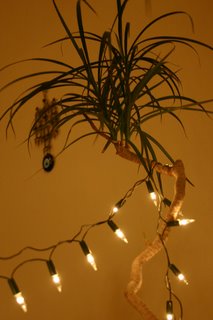


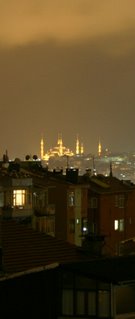




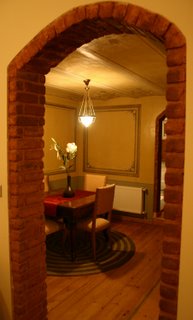
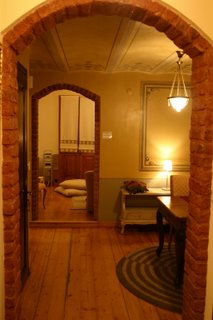
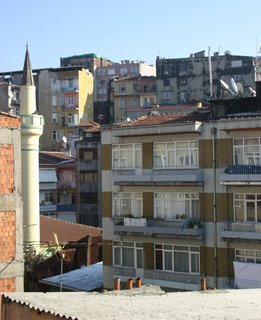

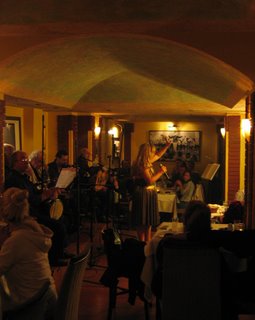
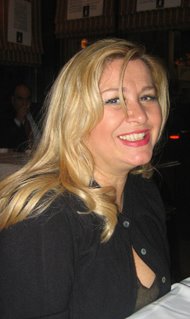

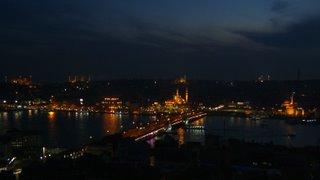

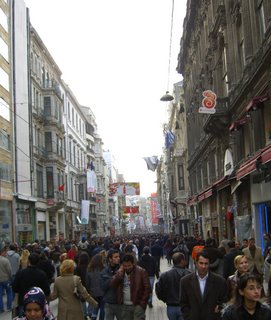

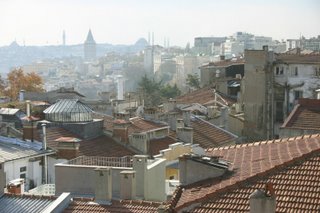

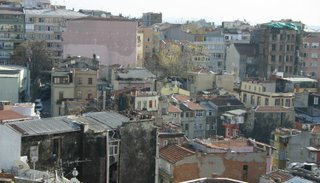



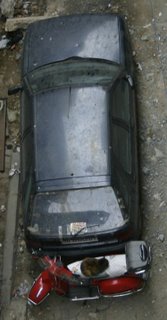



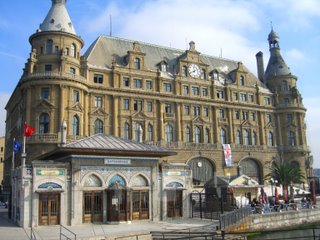

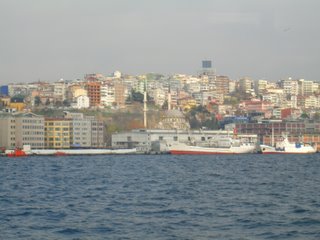



















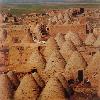








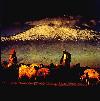
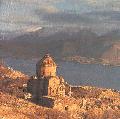
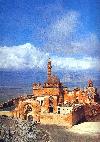


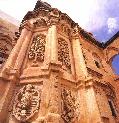
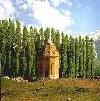
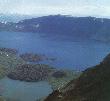
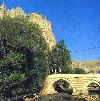

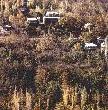

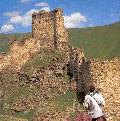



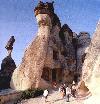
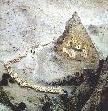
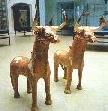
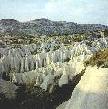

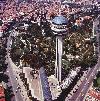



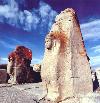




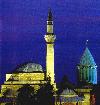

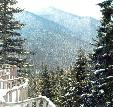
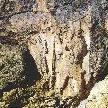




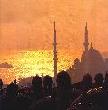

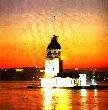




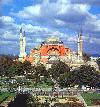

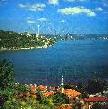

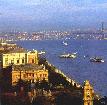



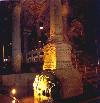








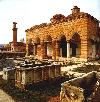
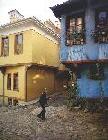


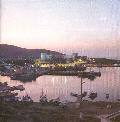

Hiç yorum yok:
Yorum Gönder